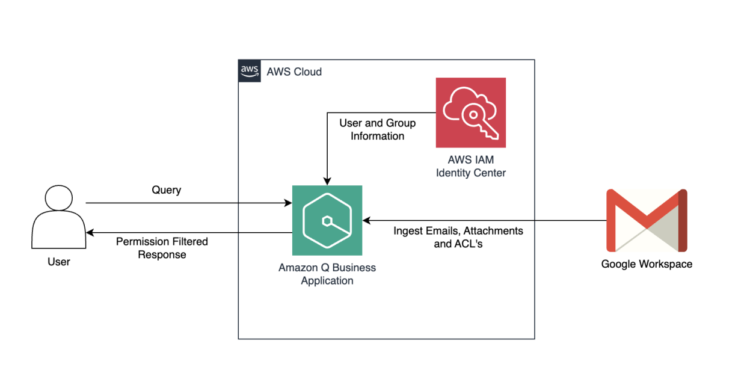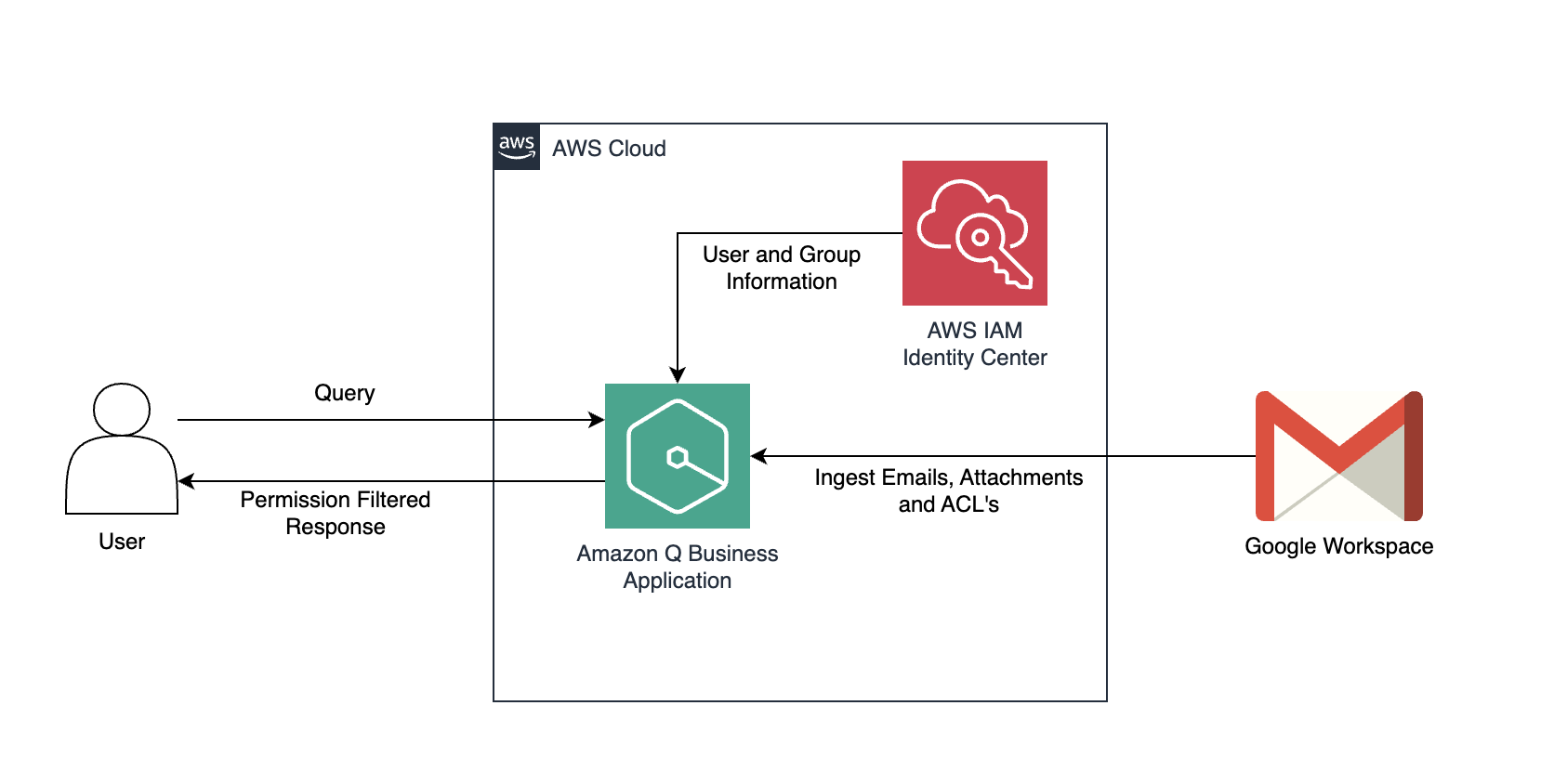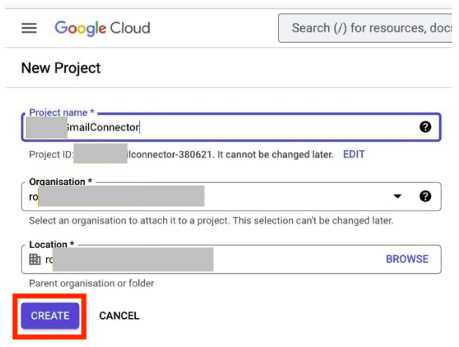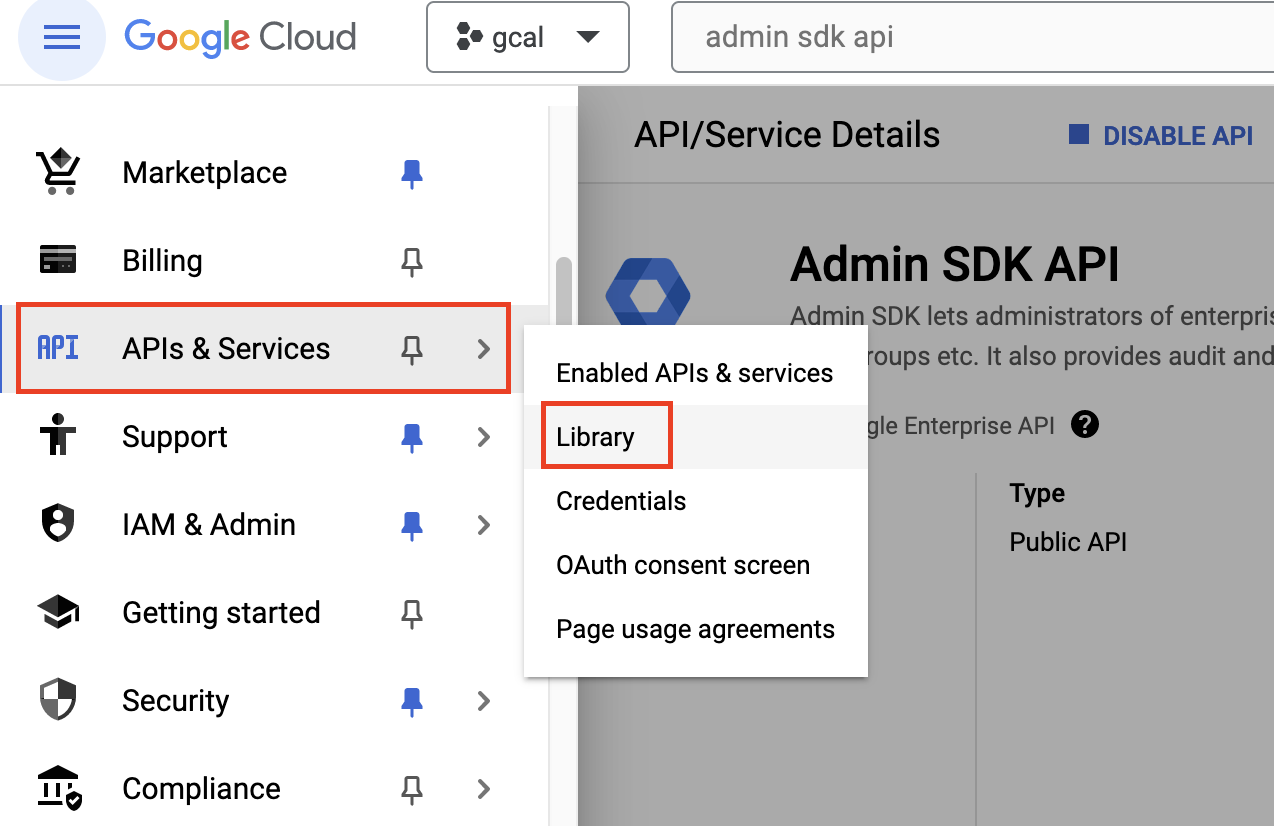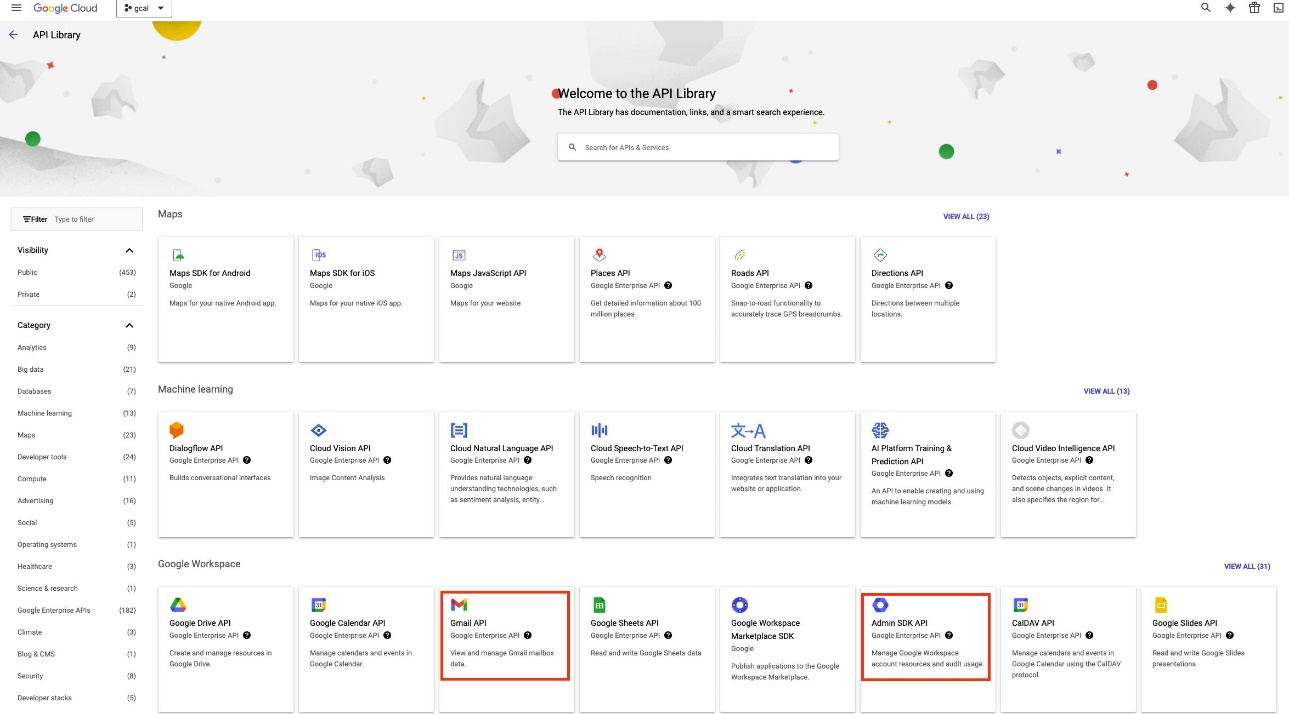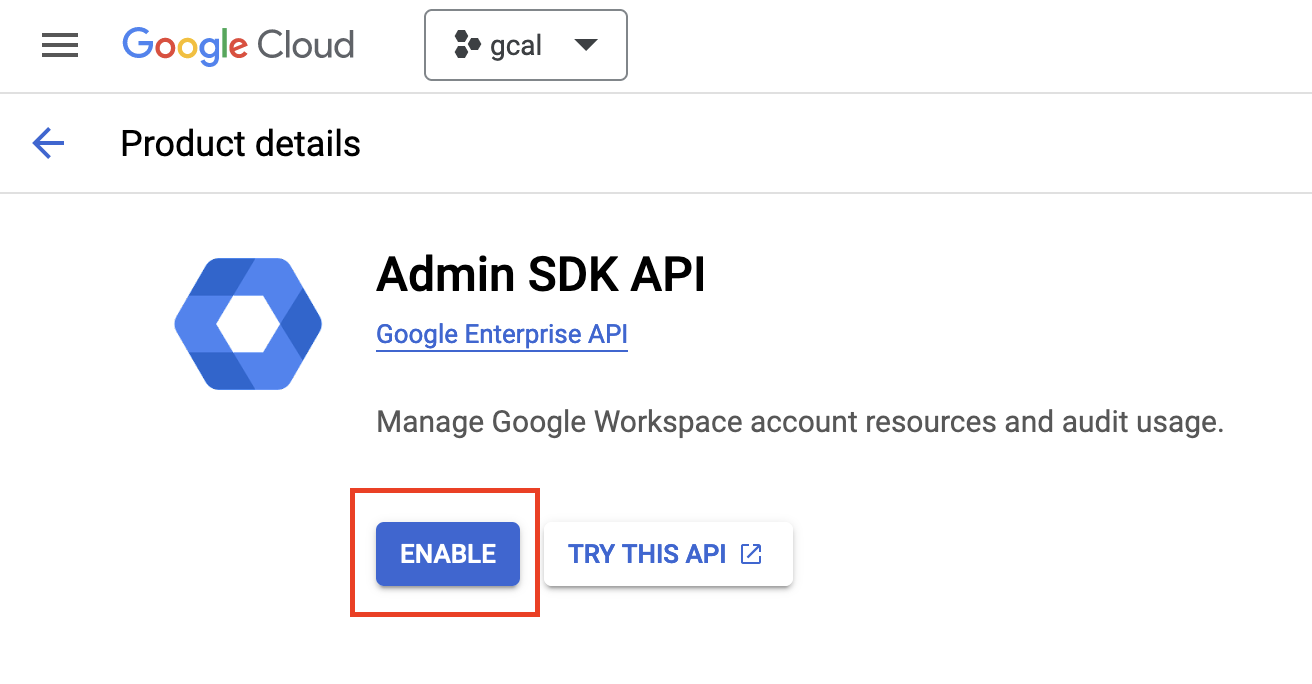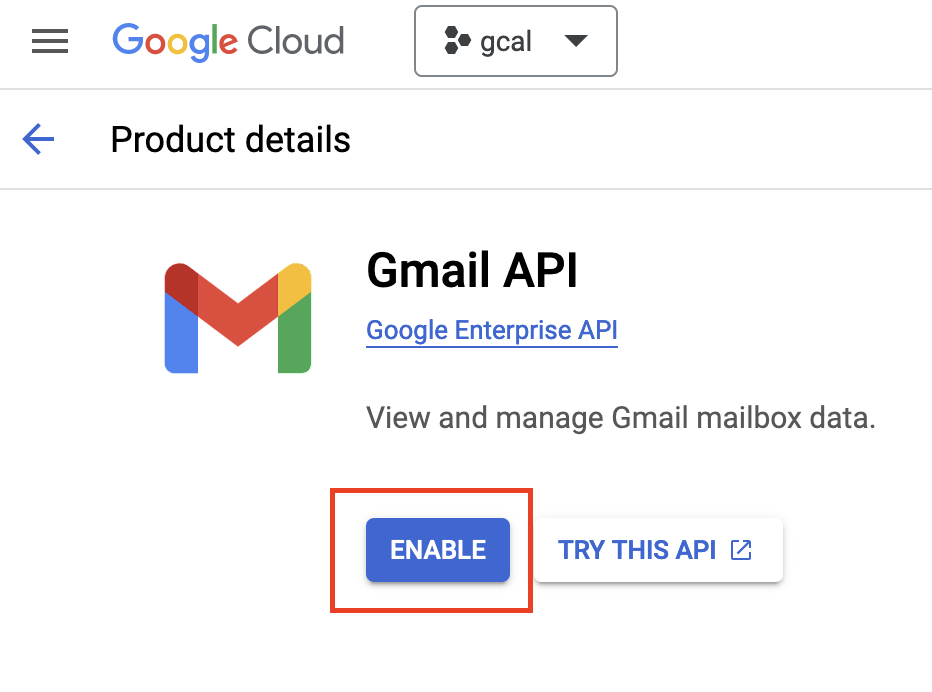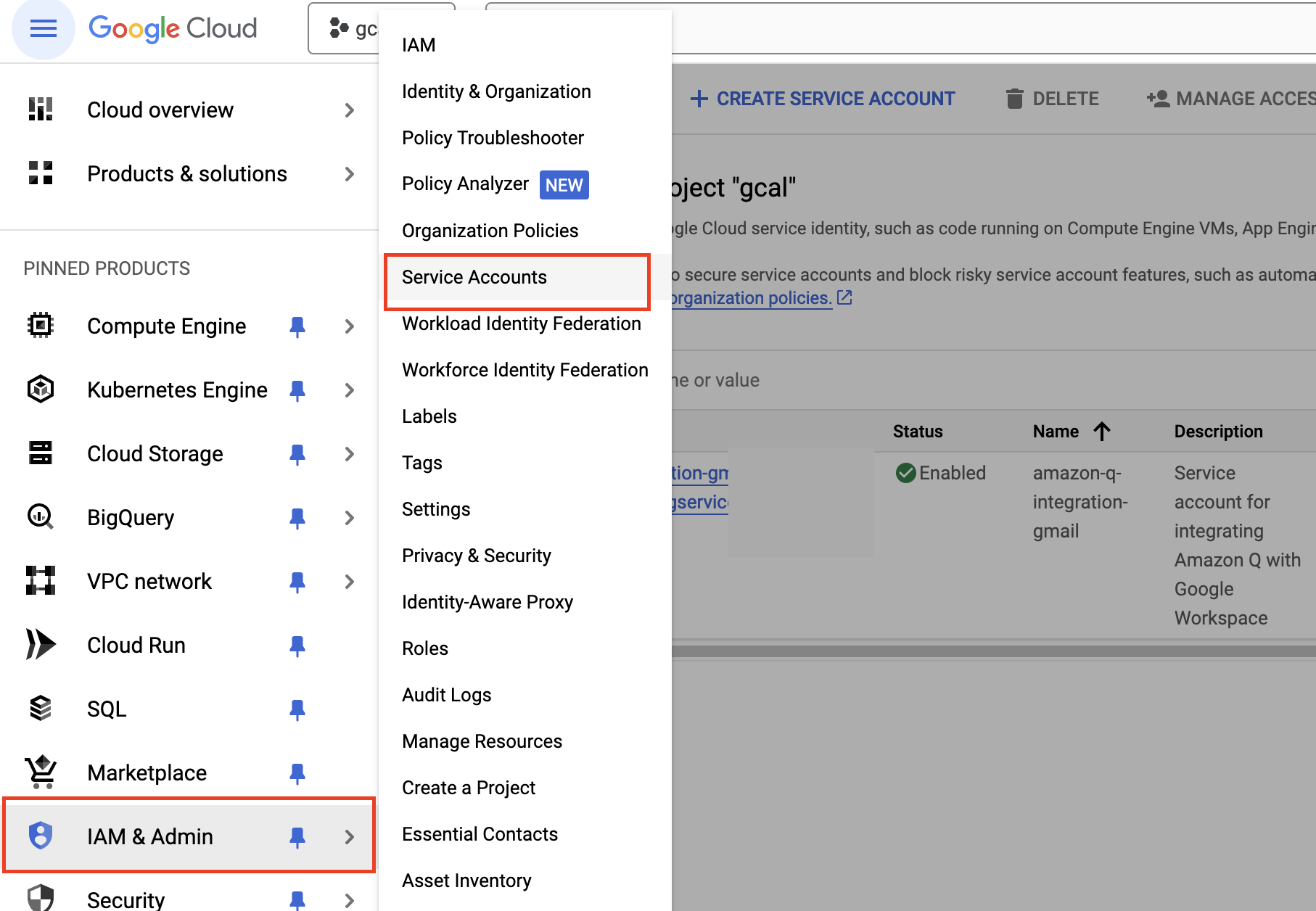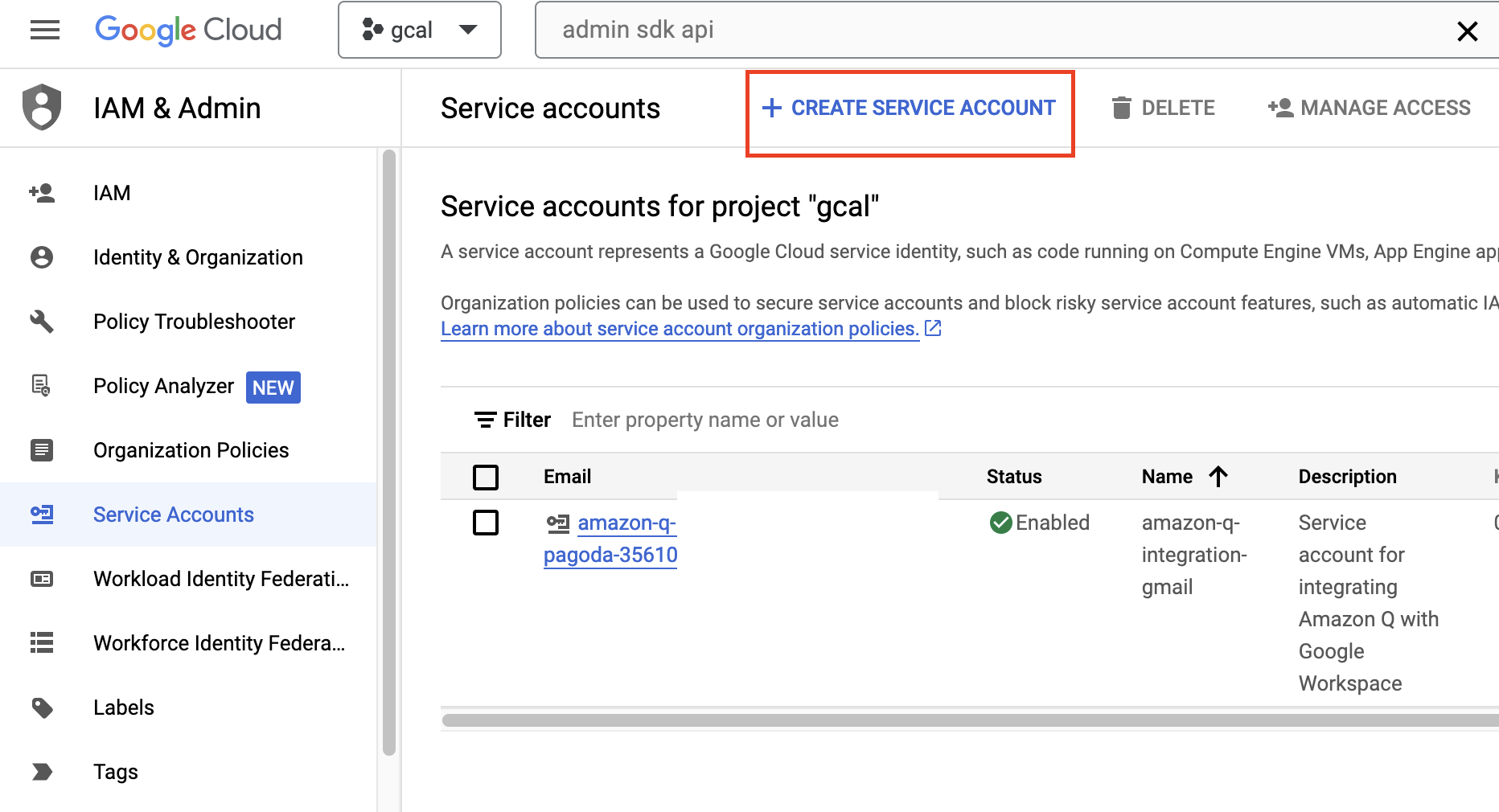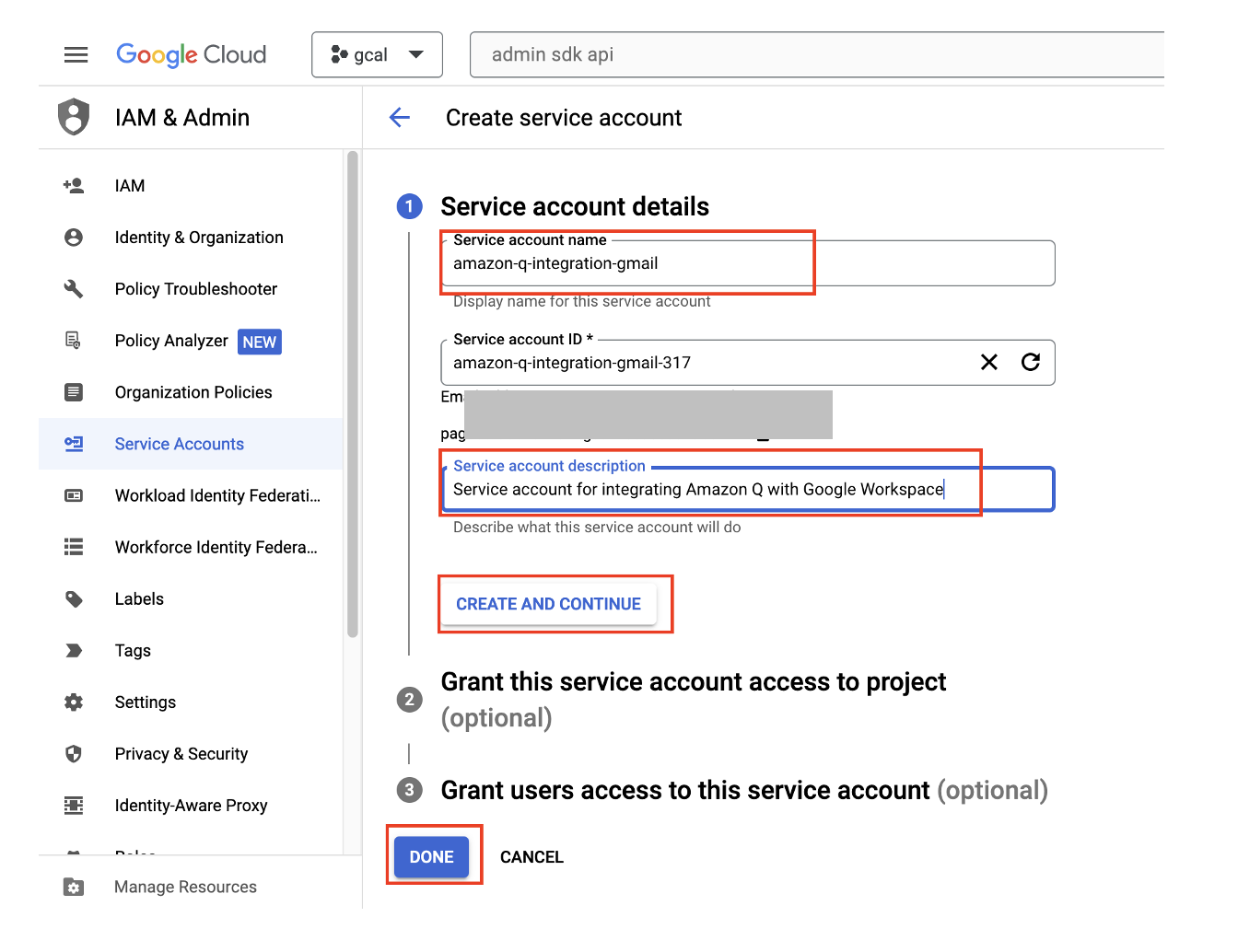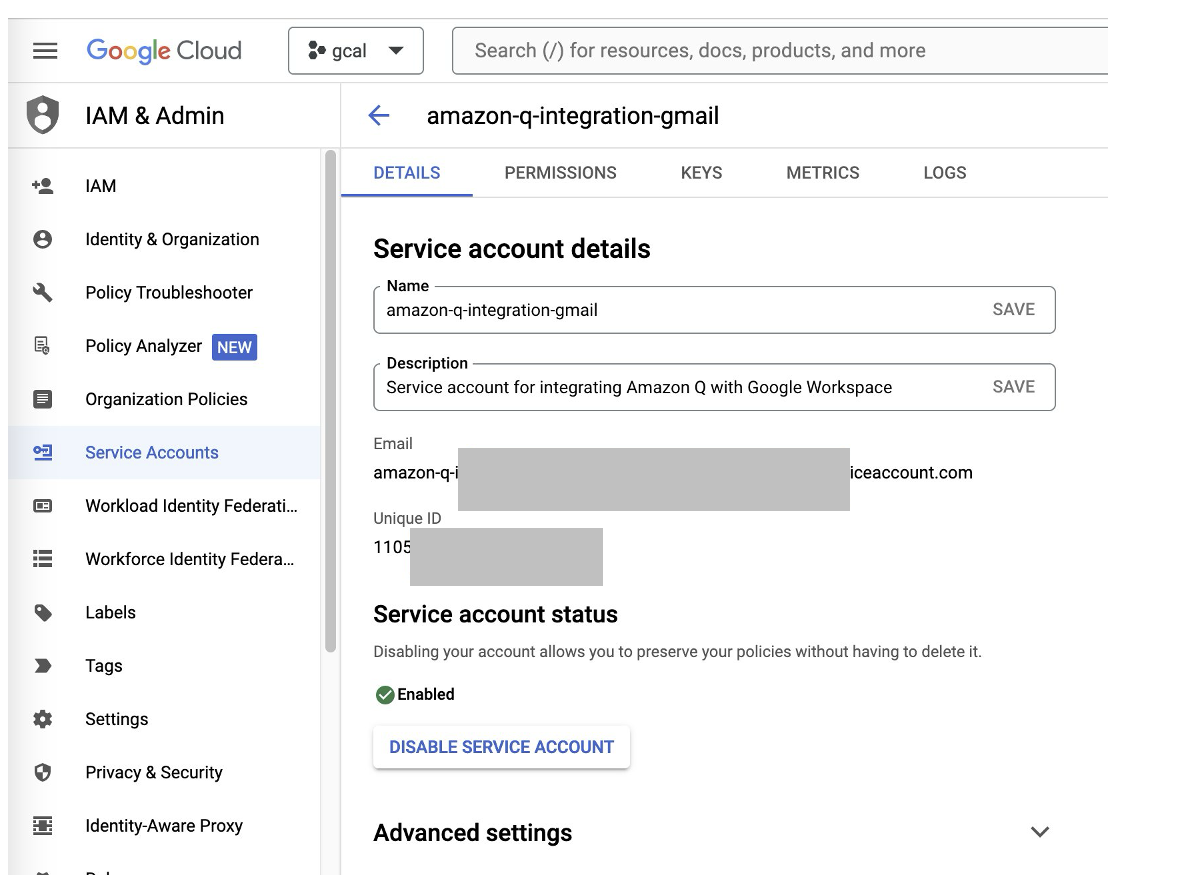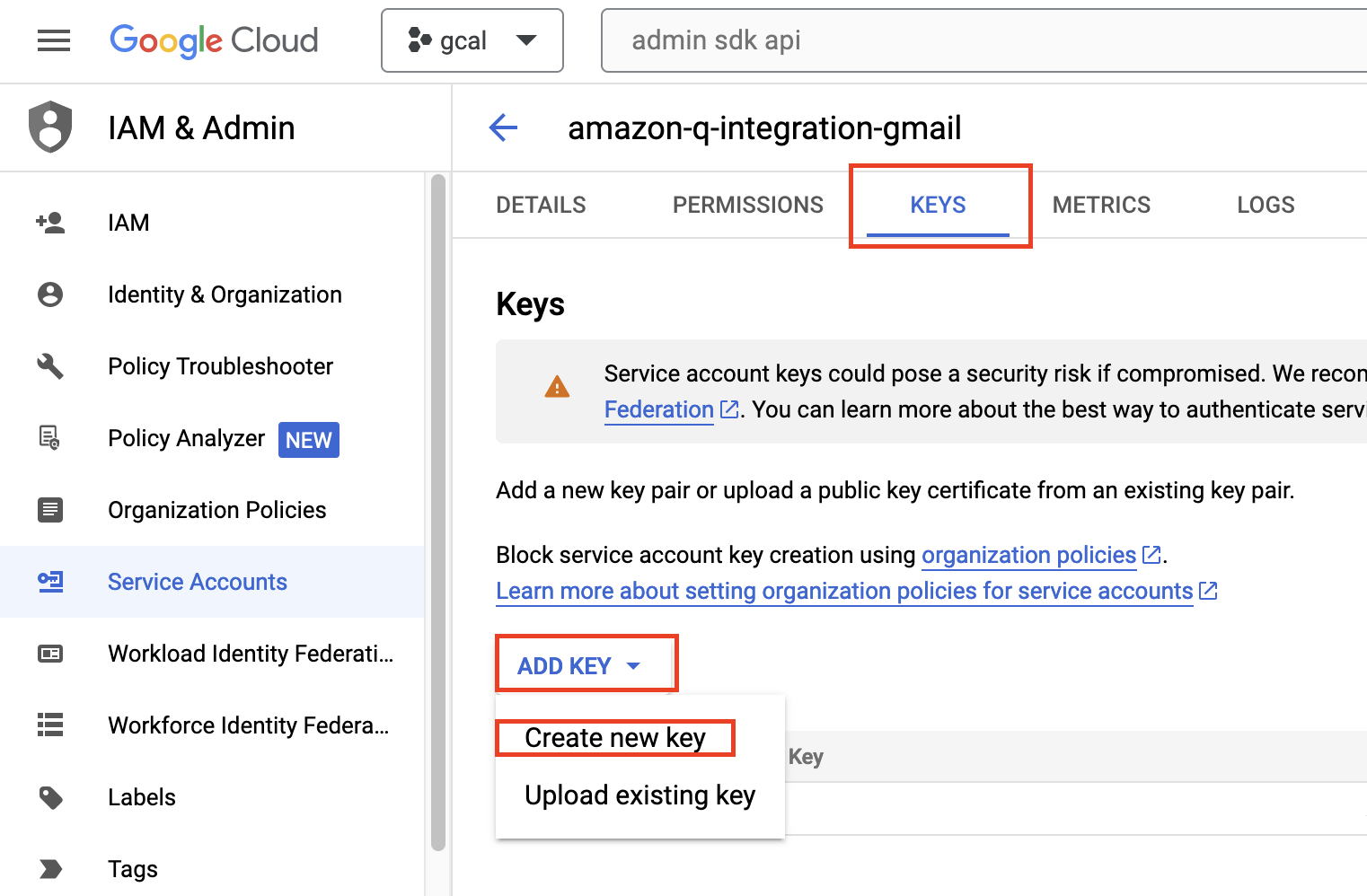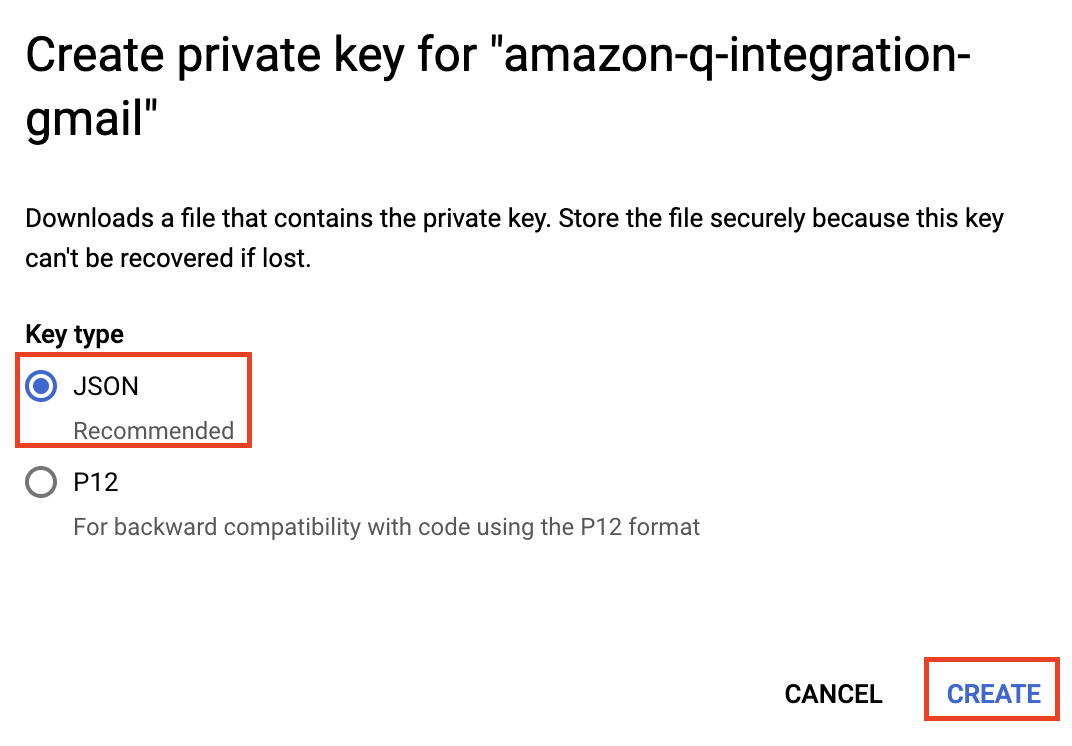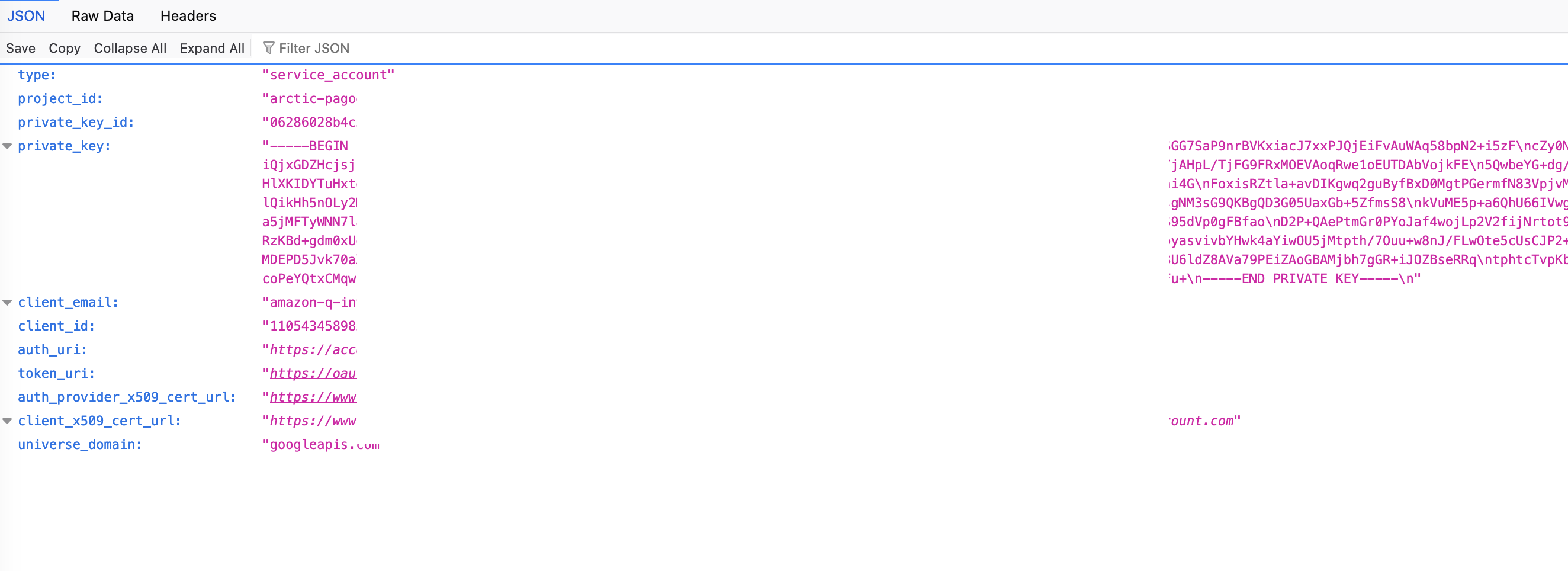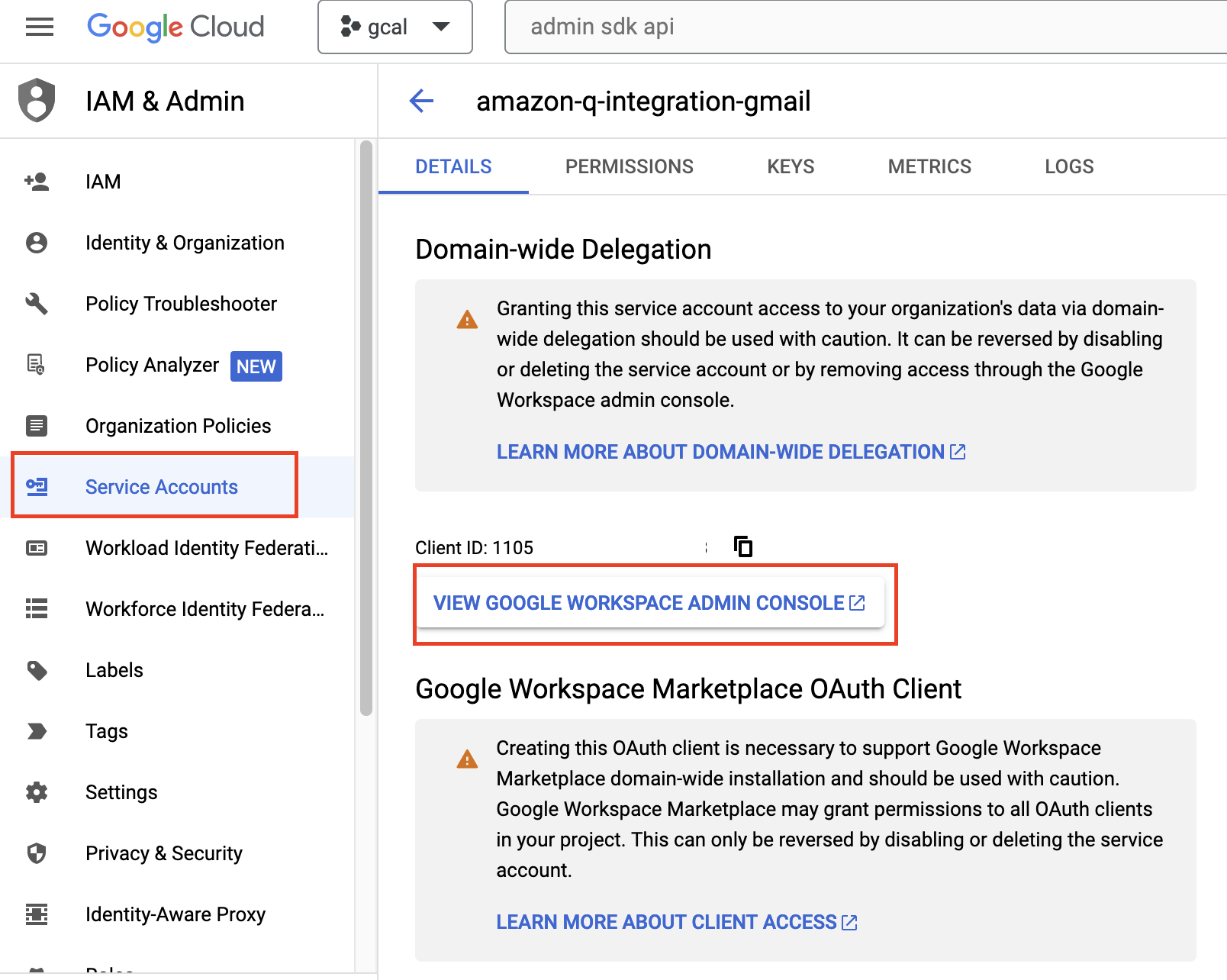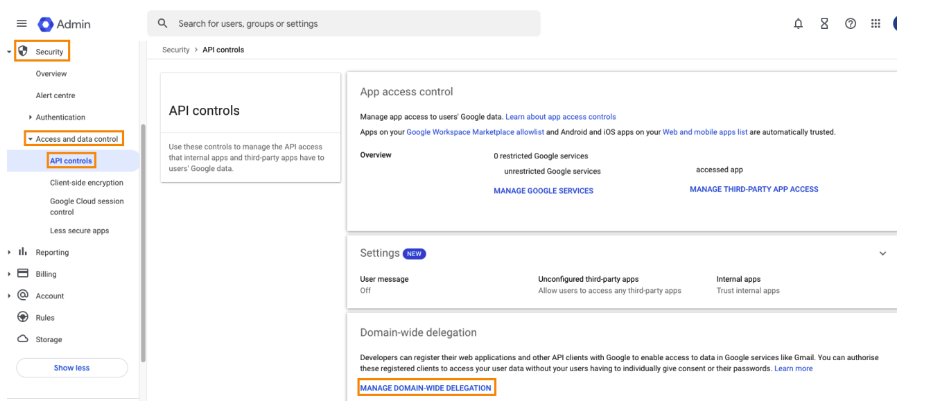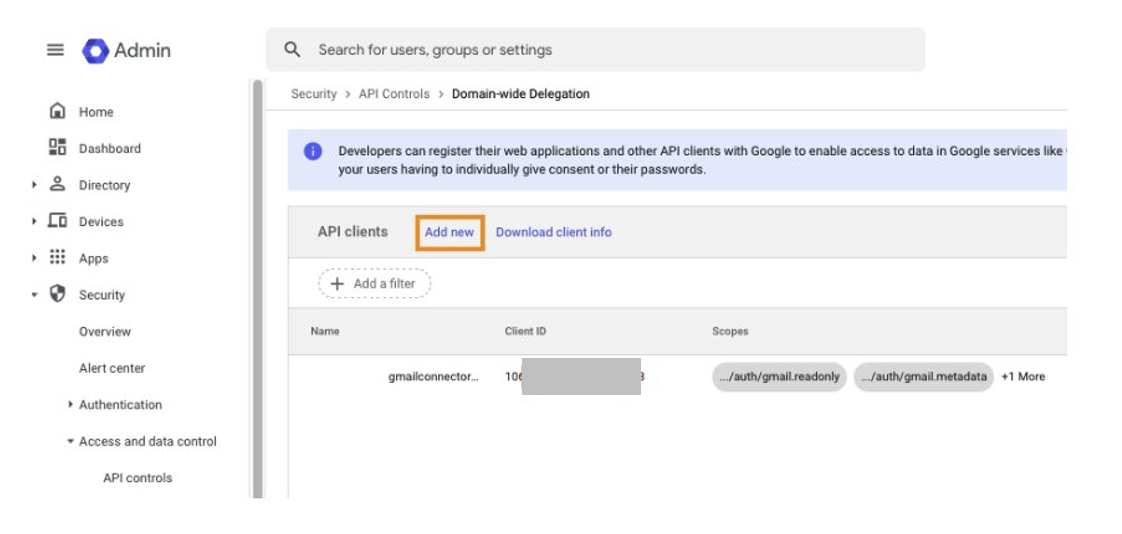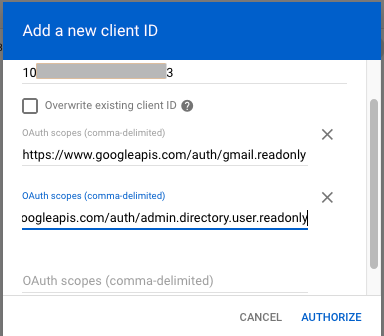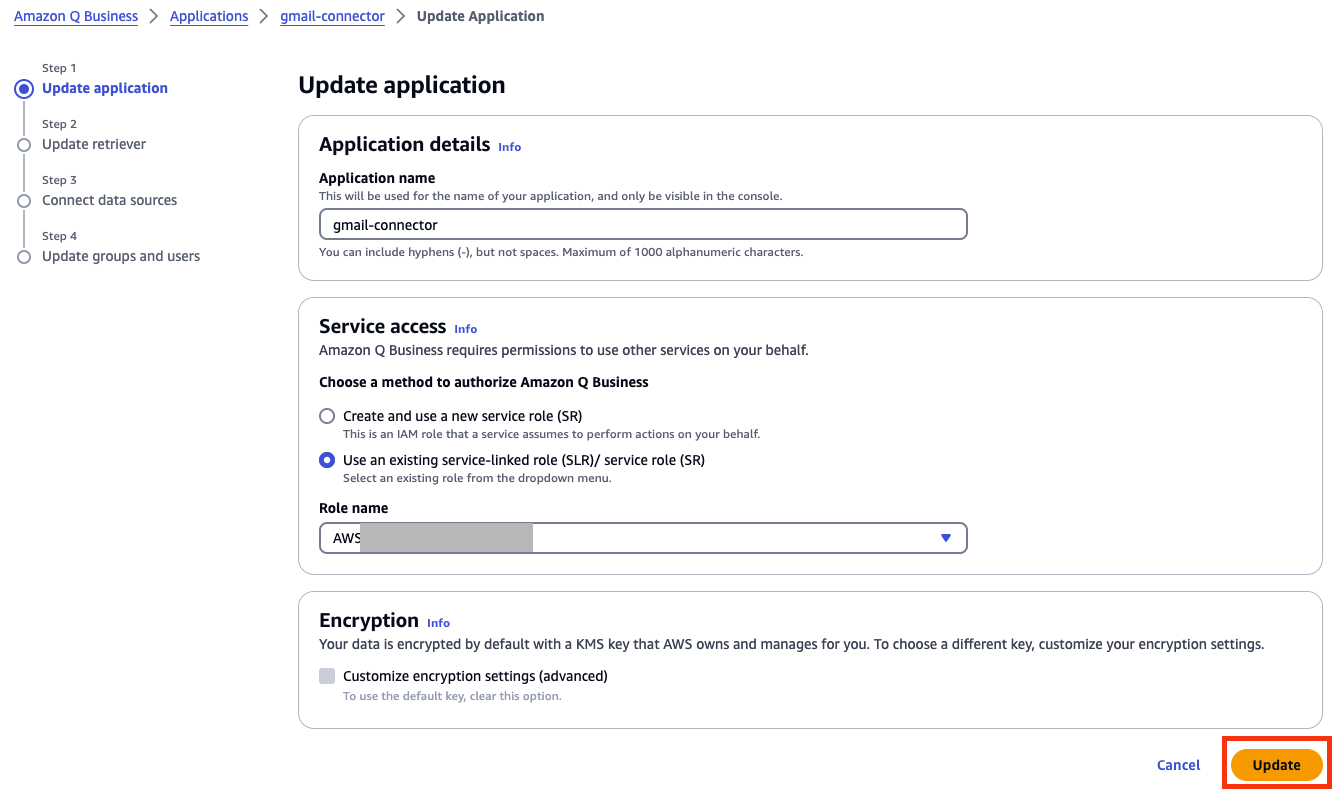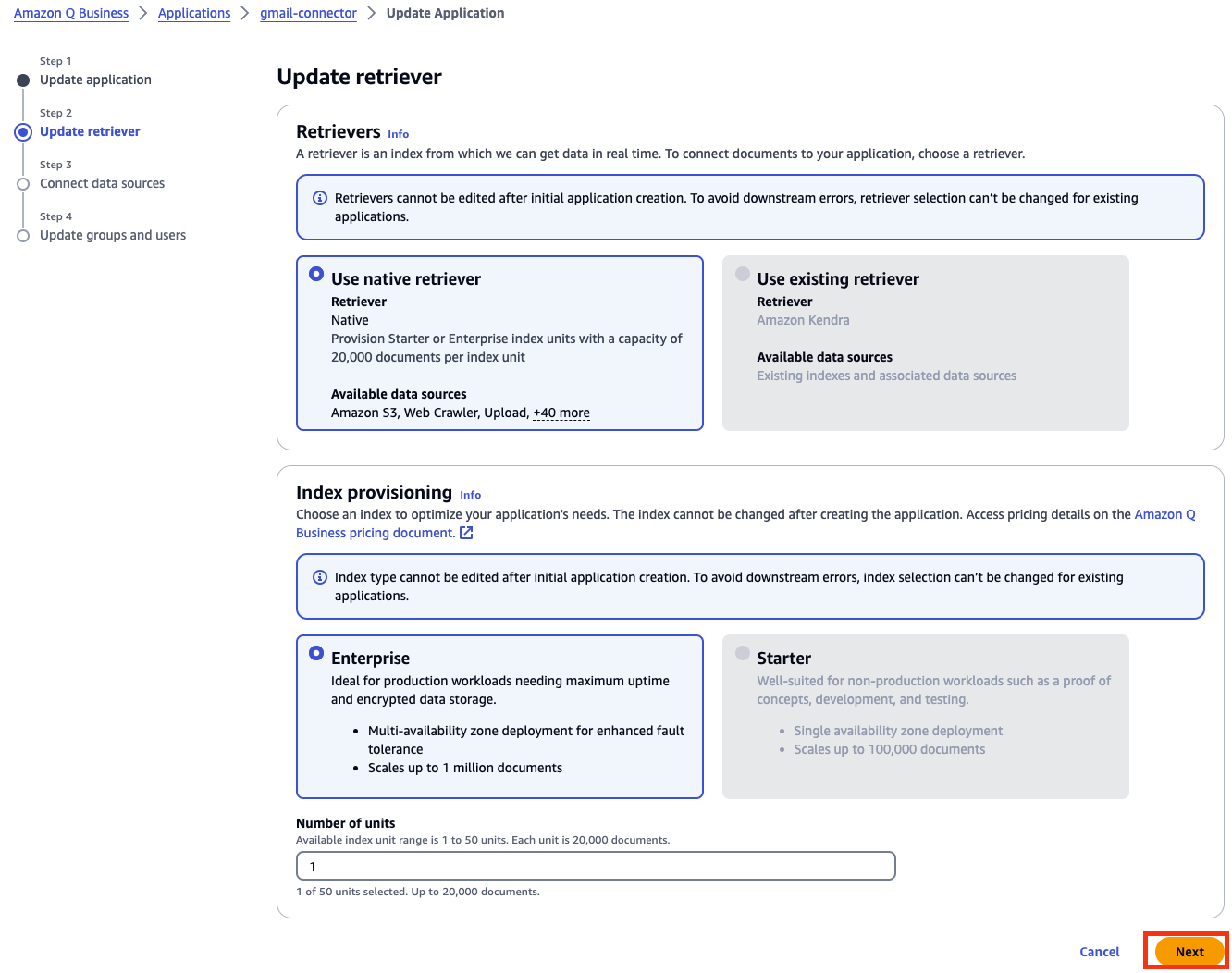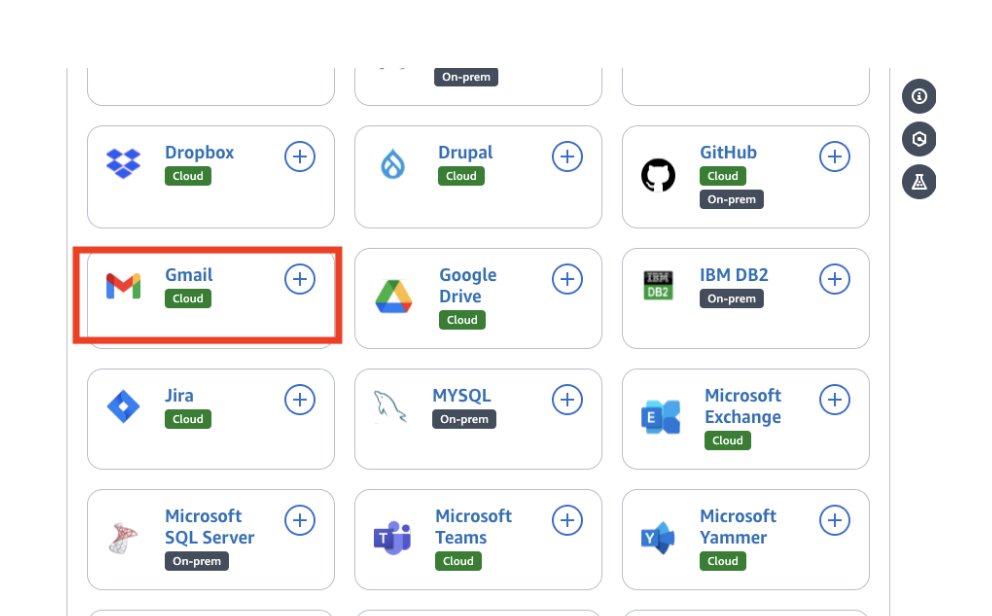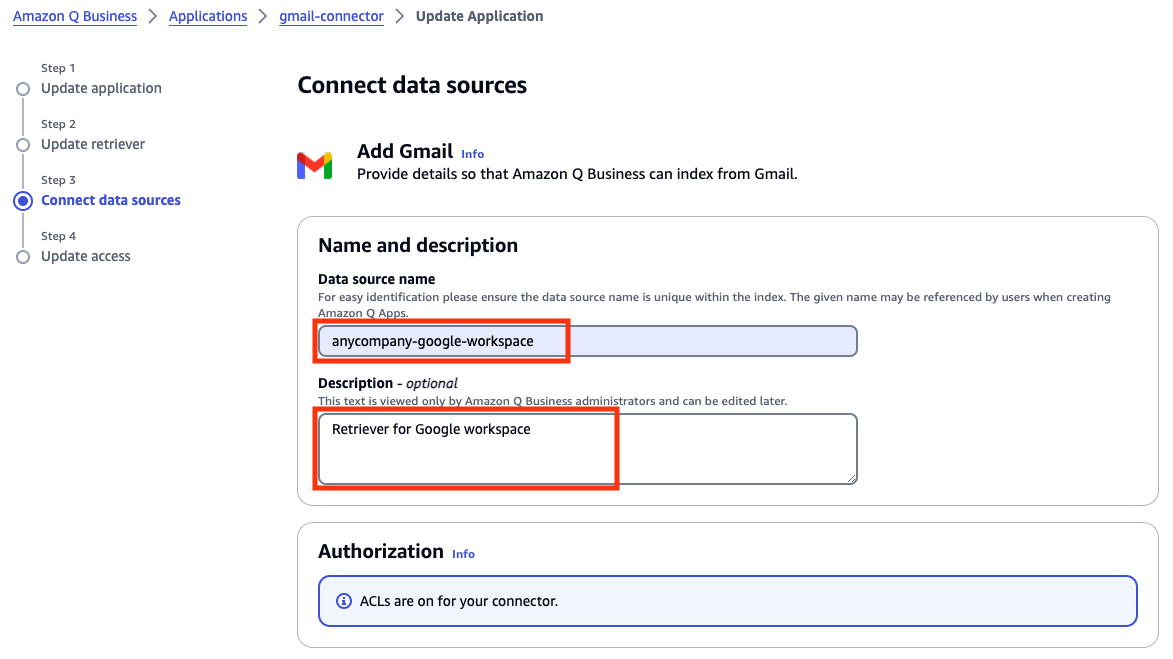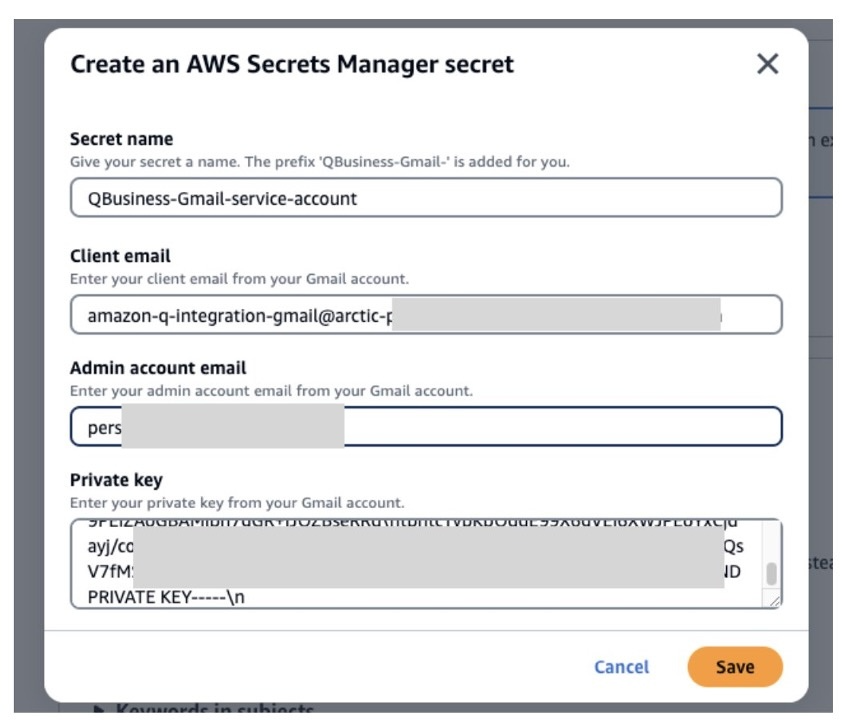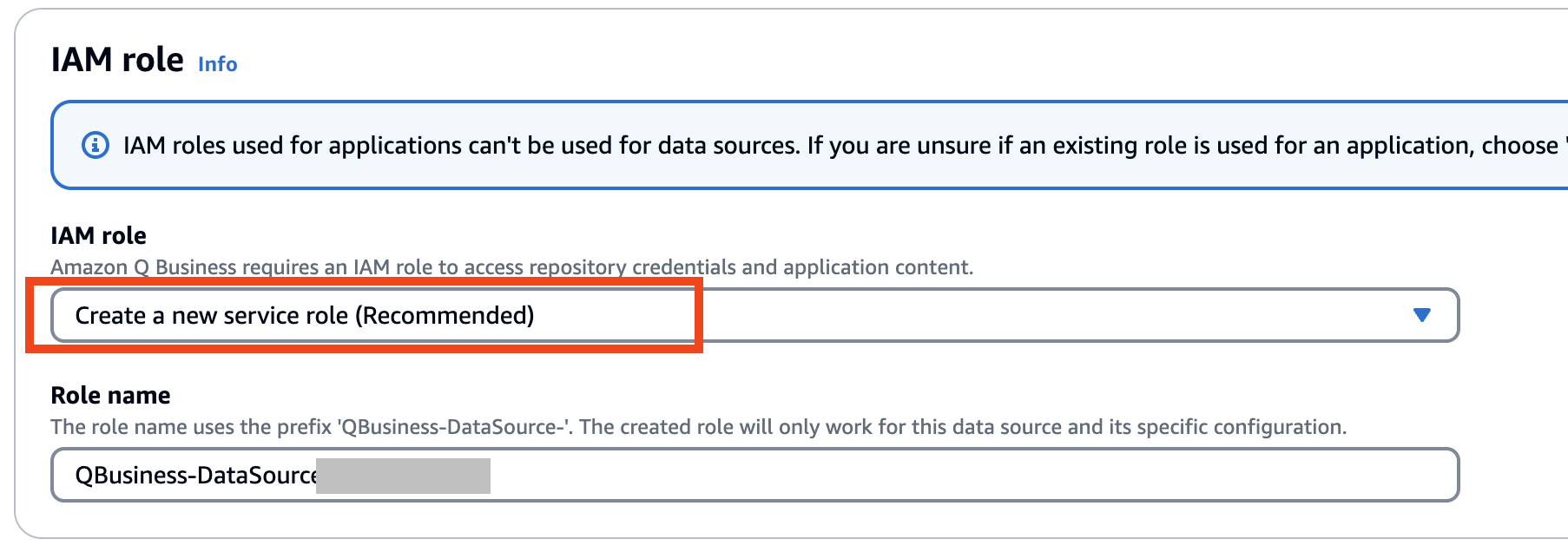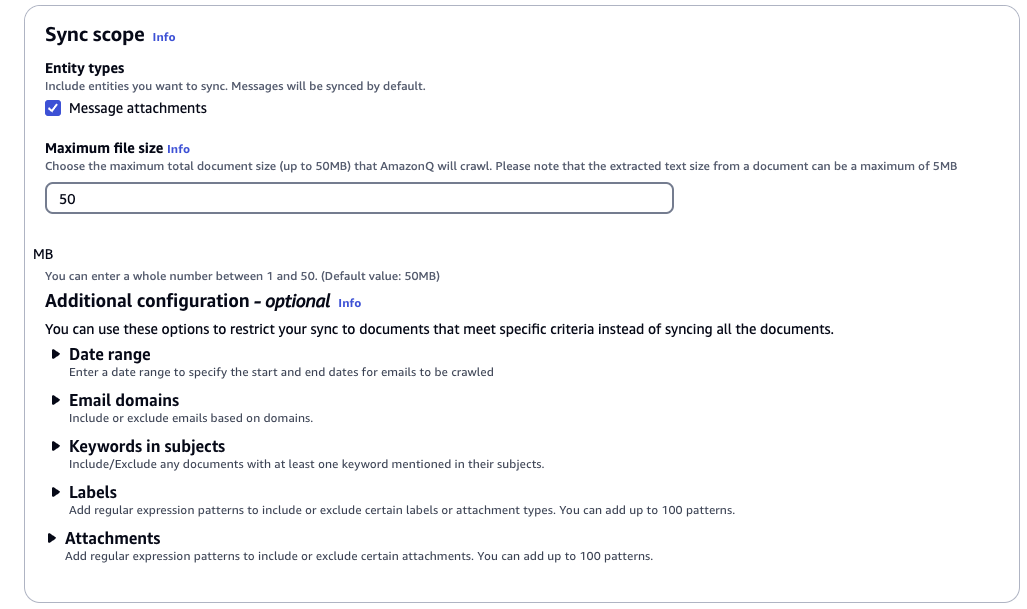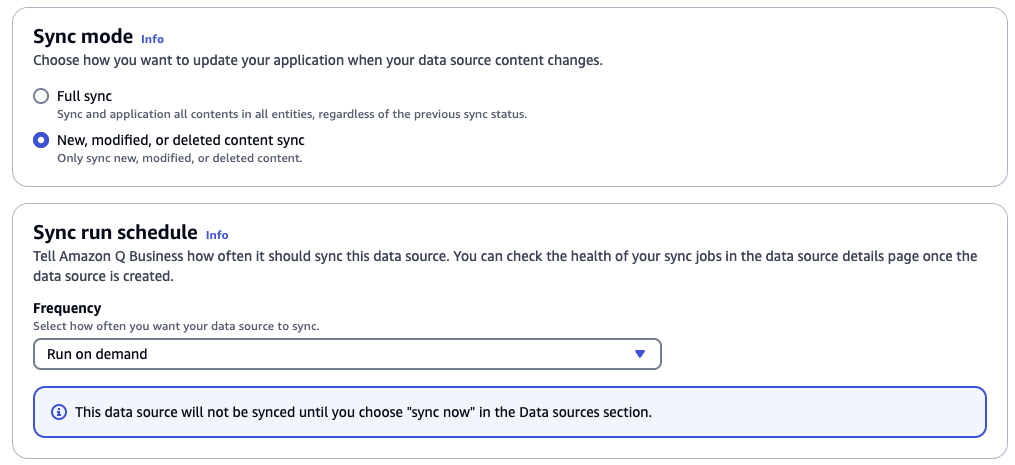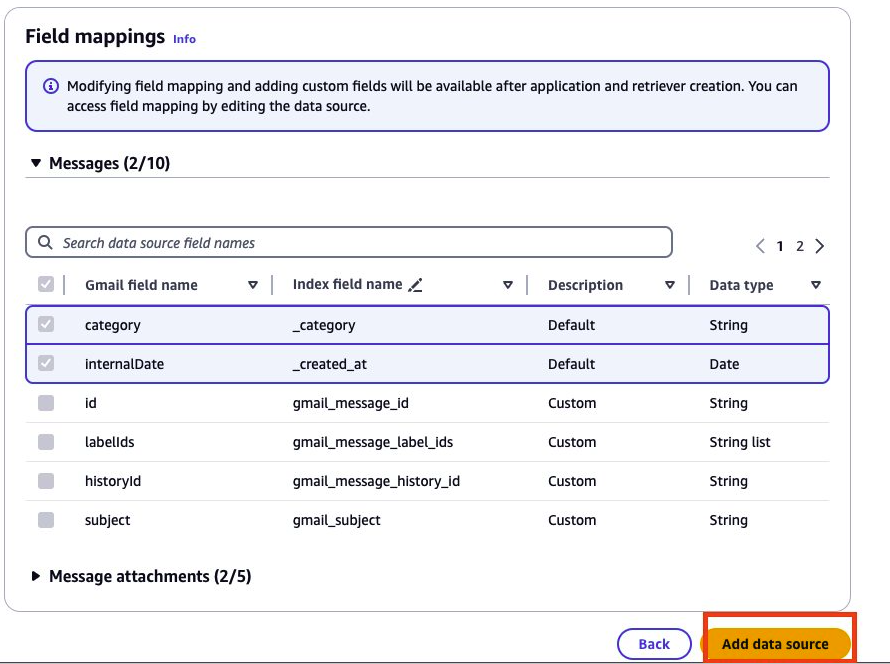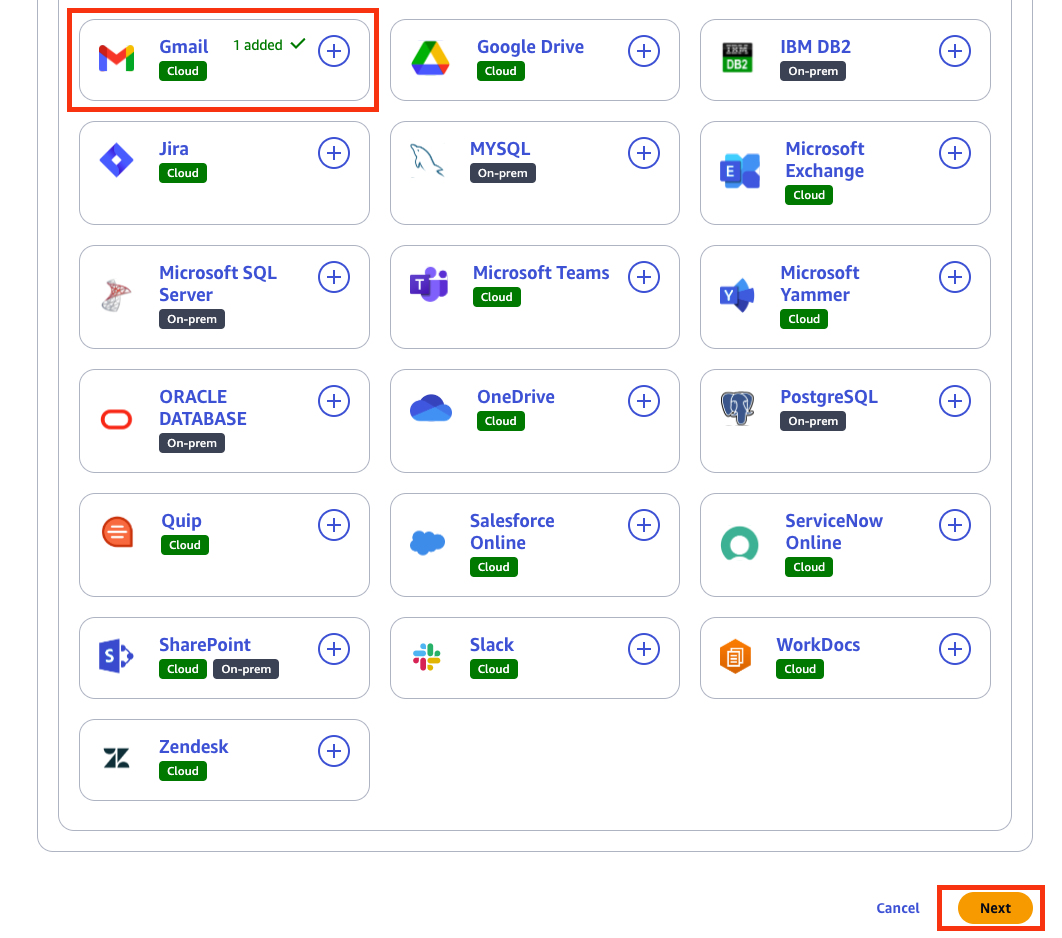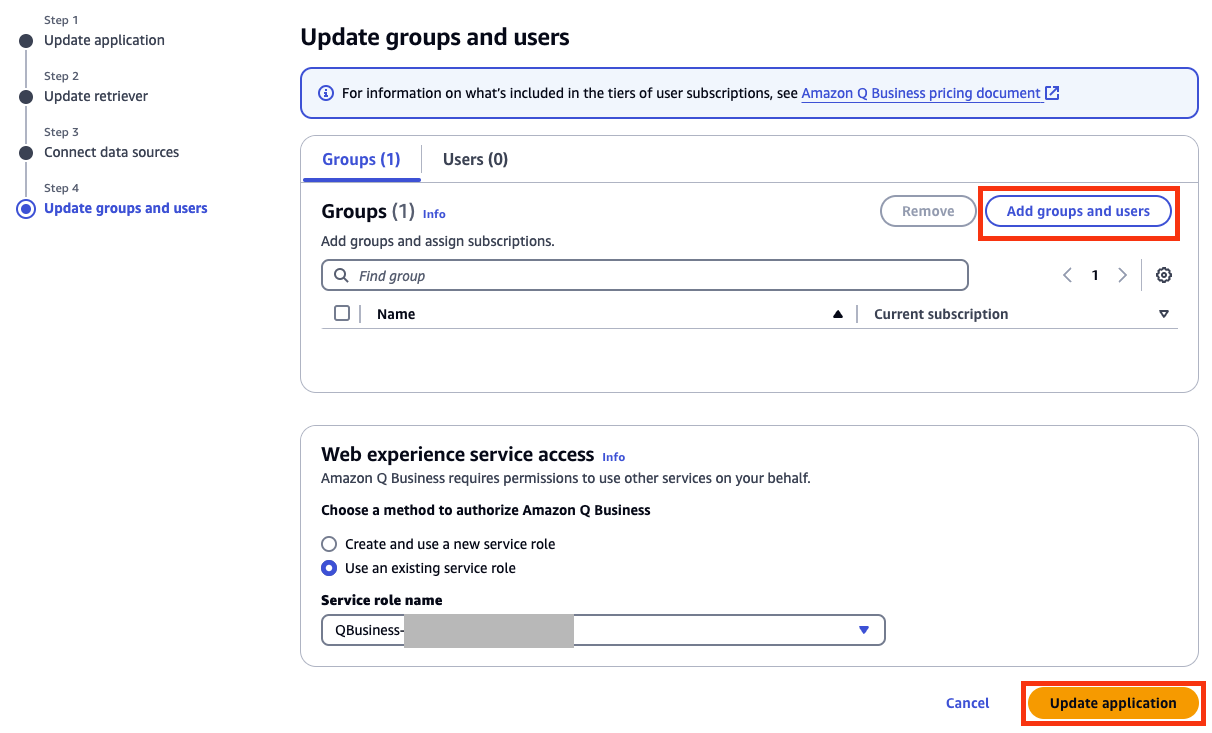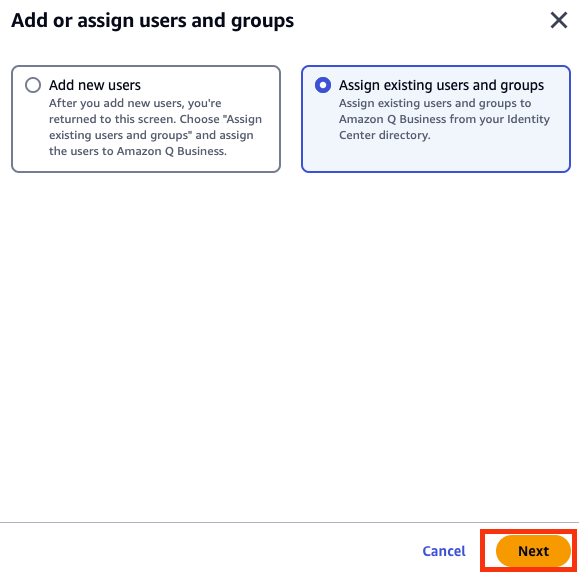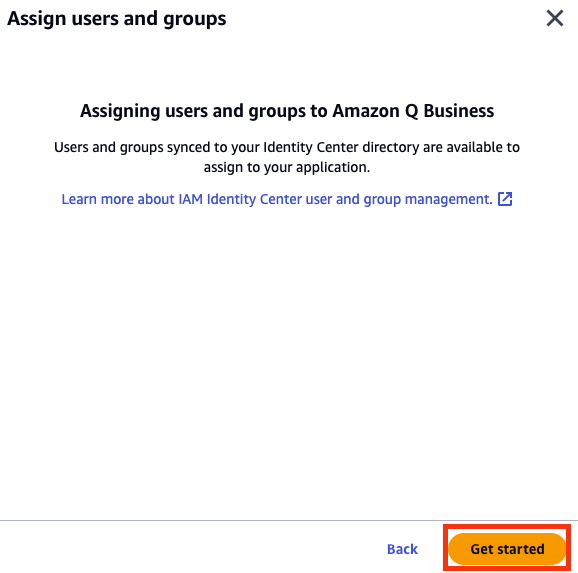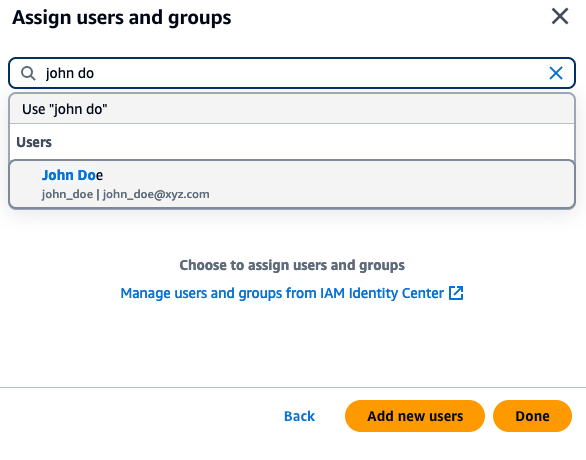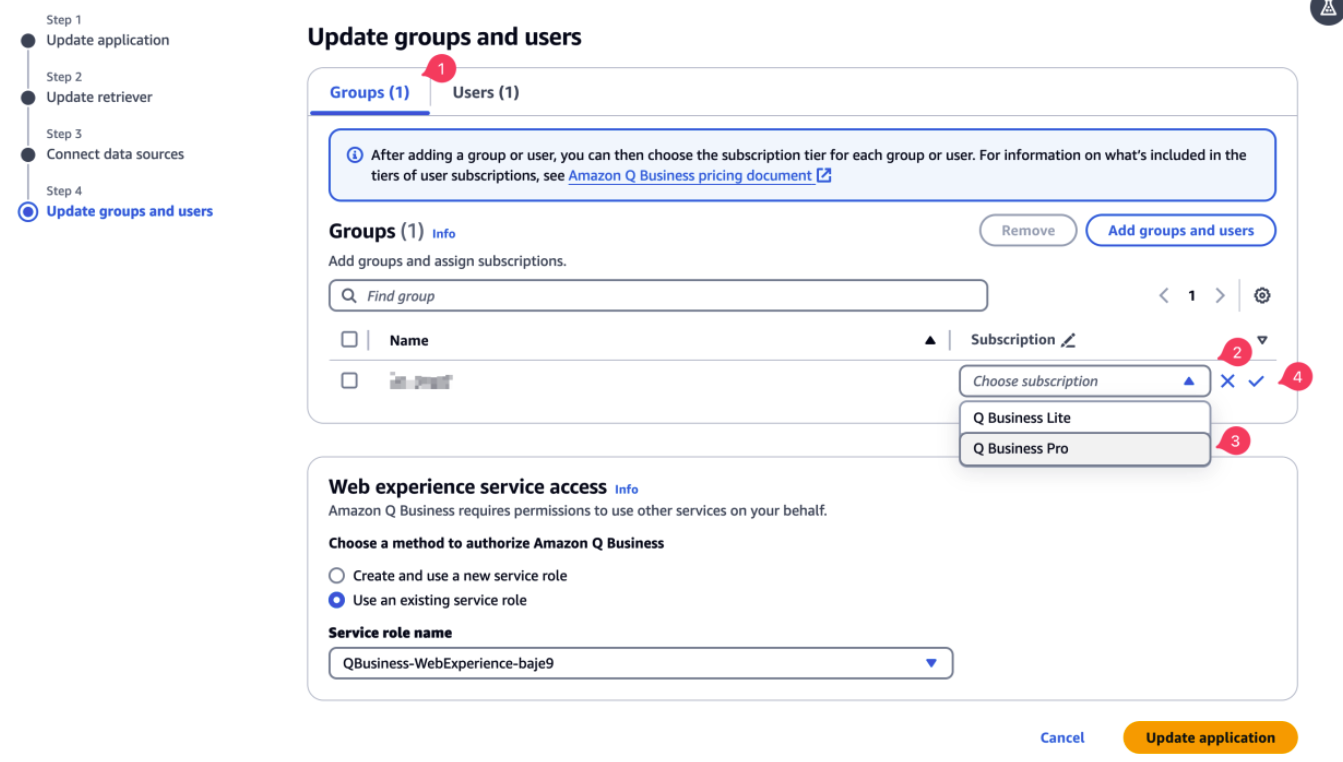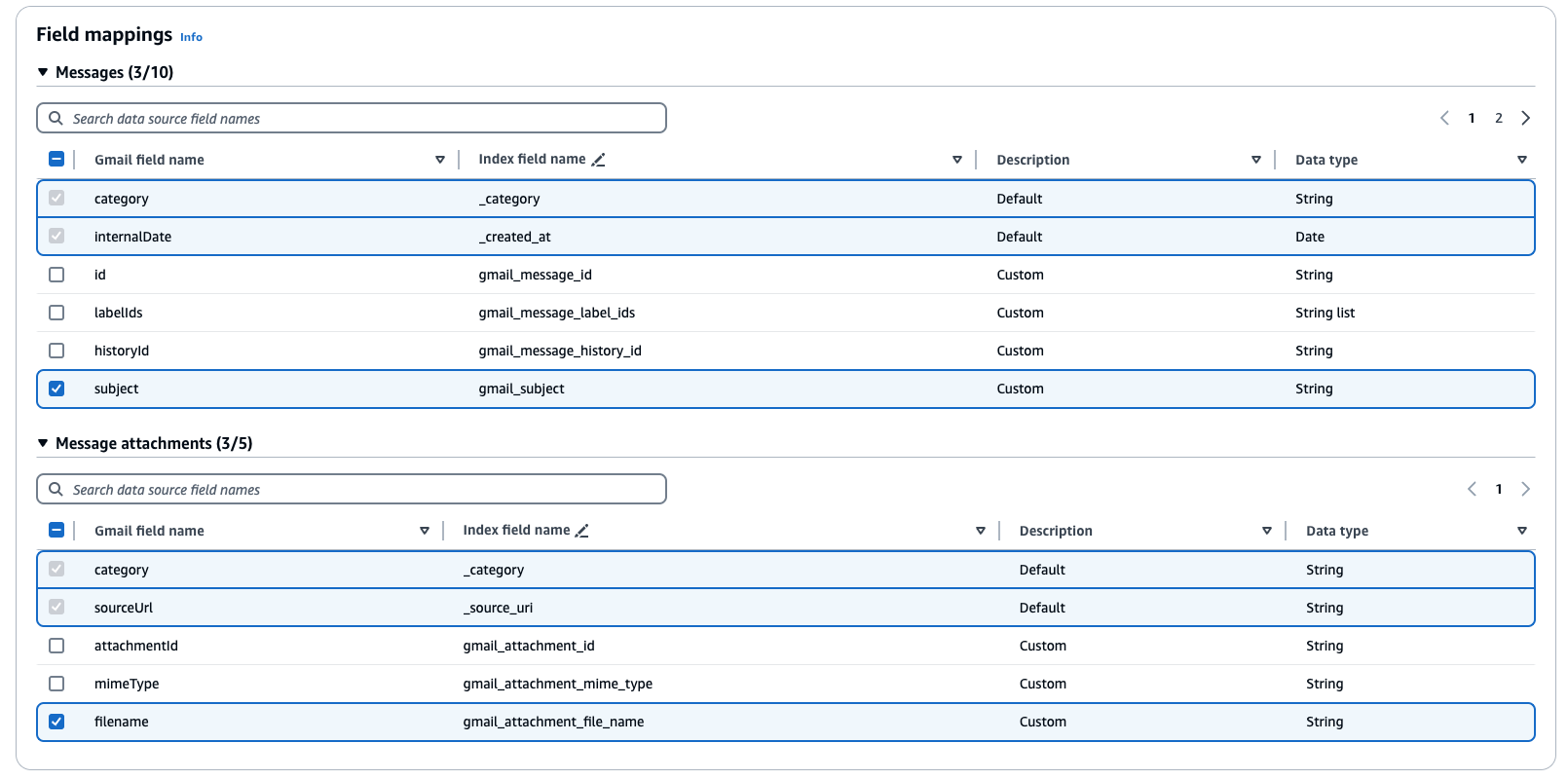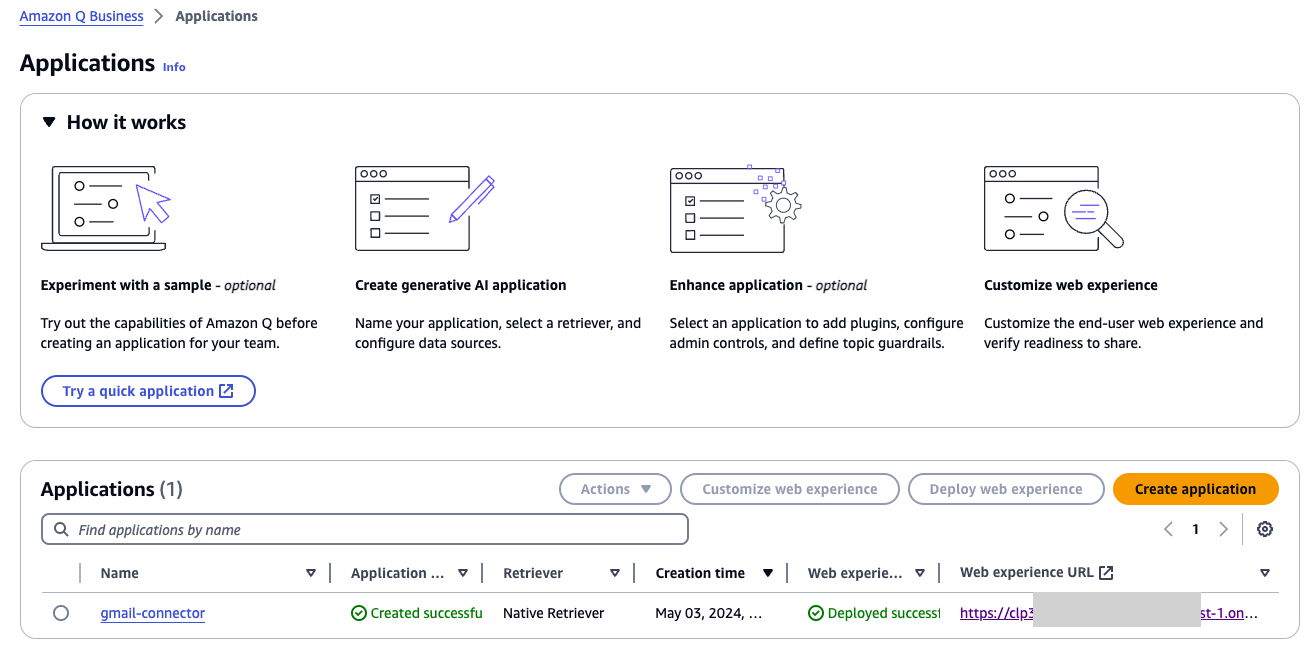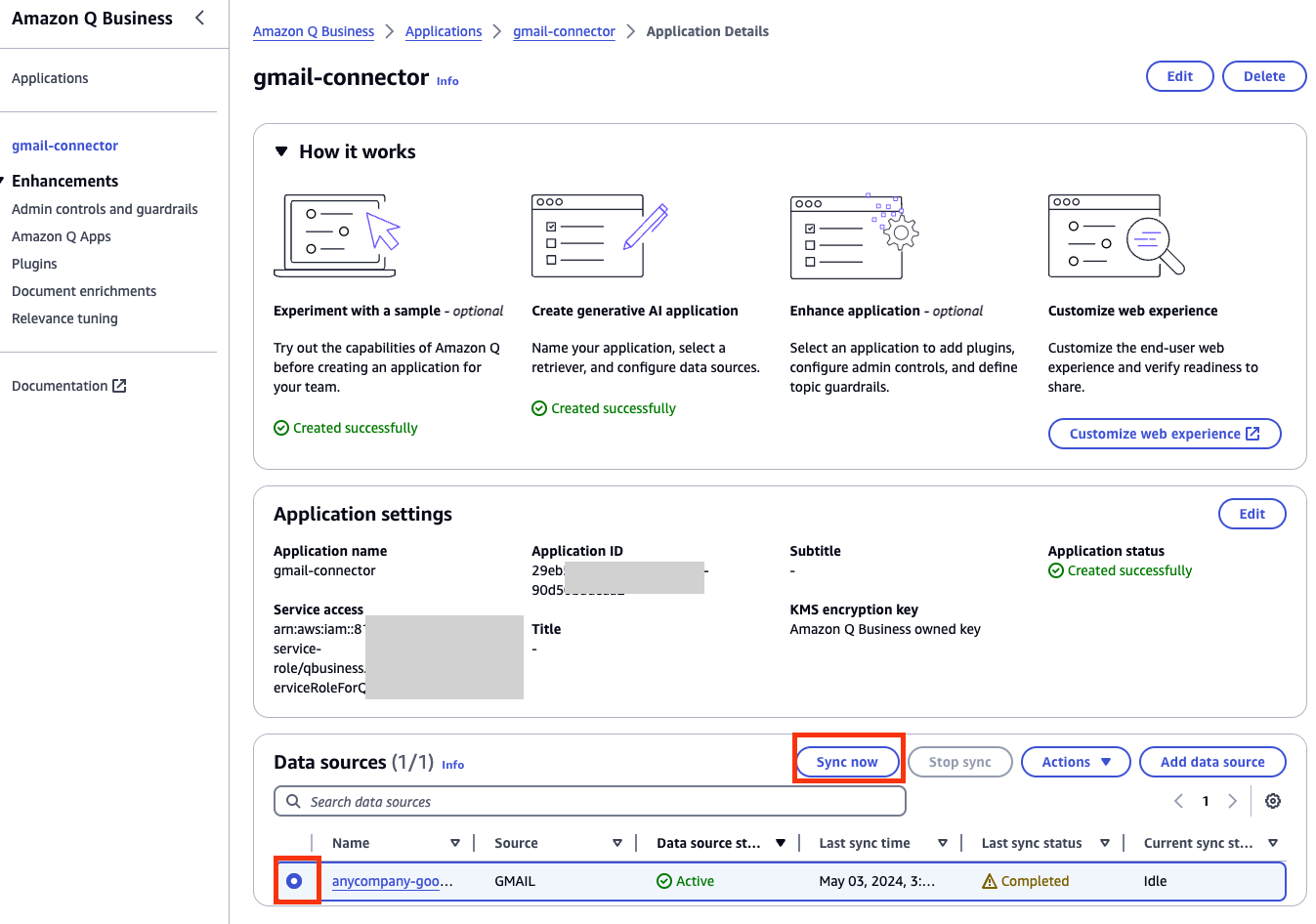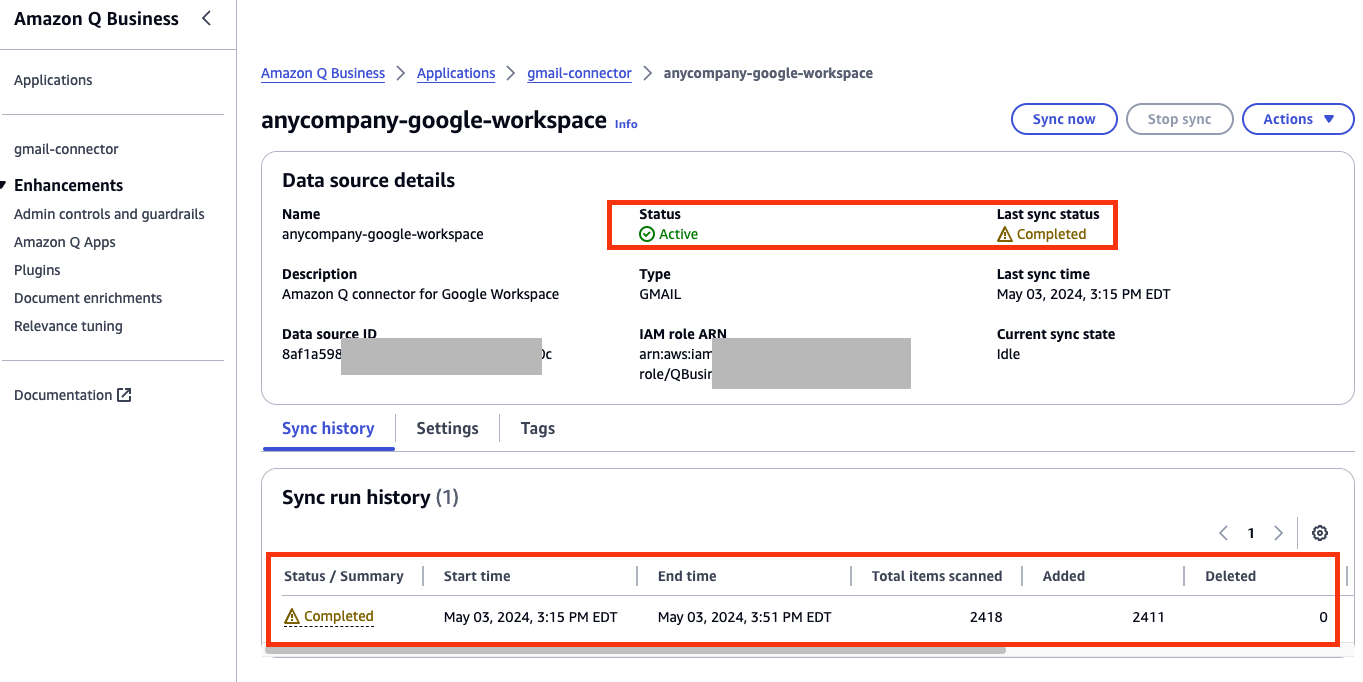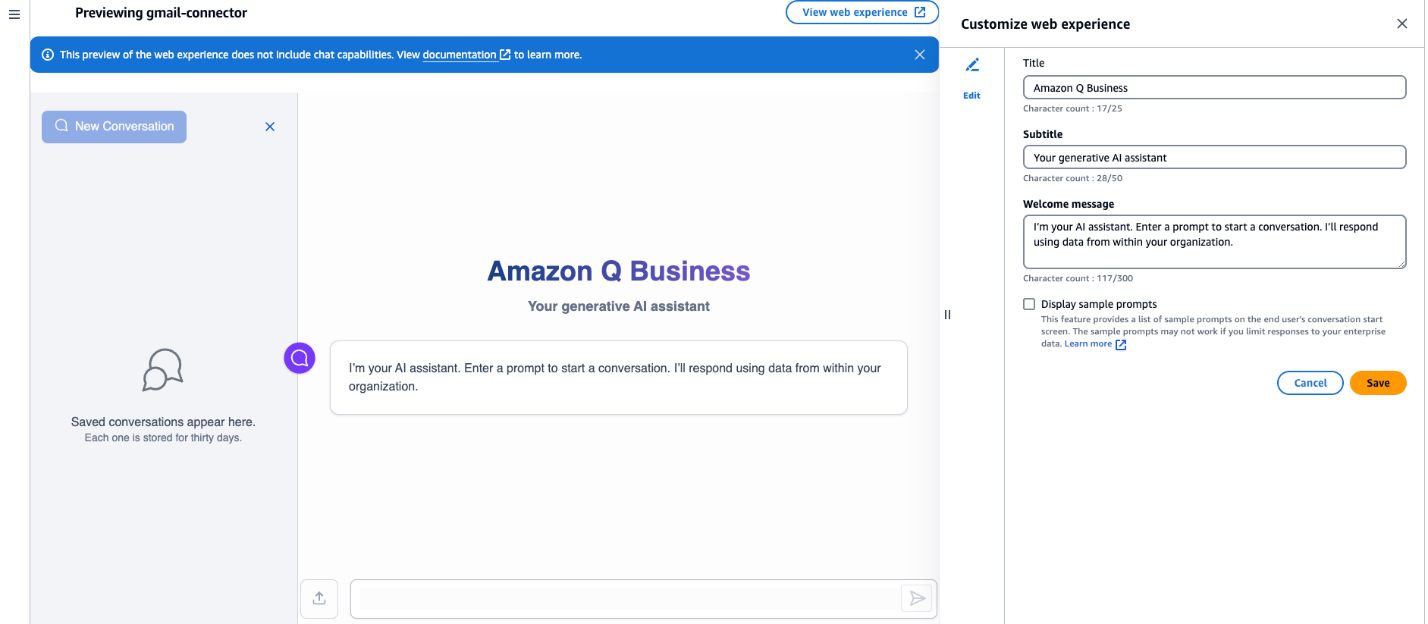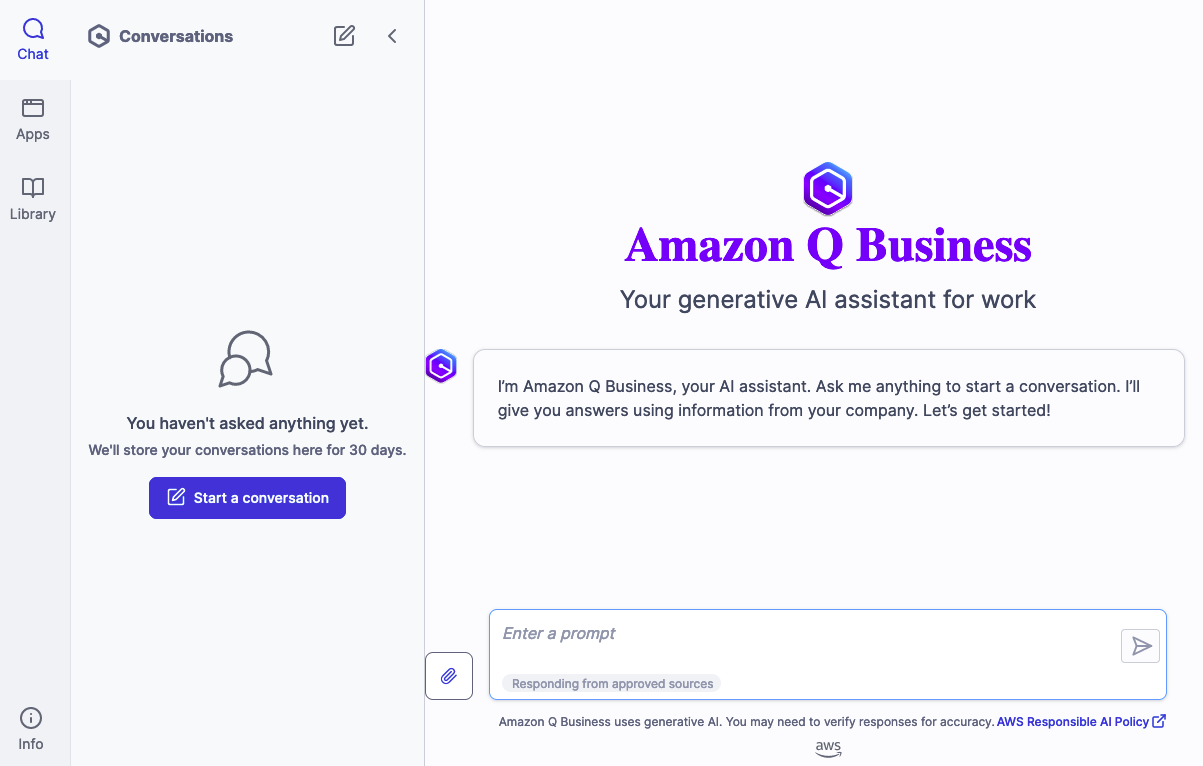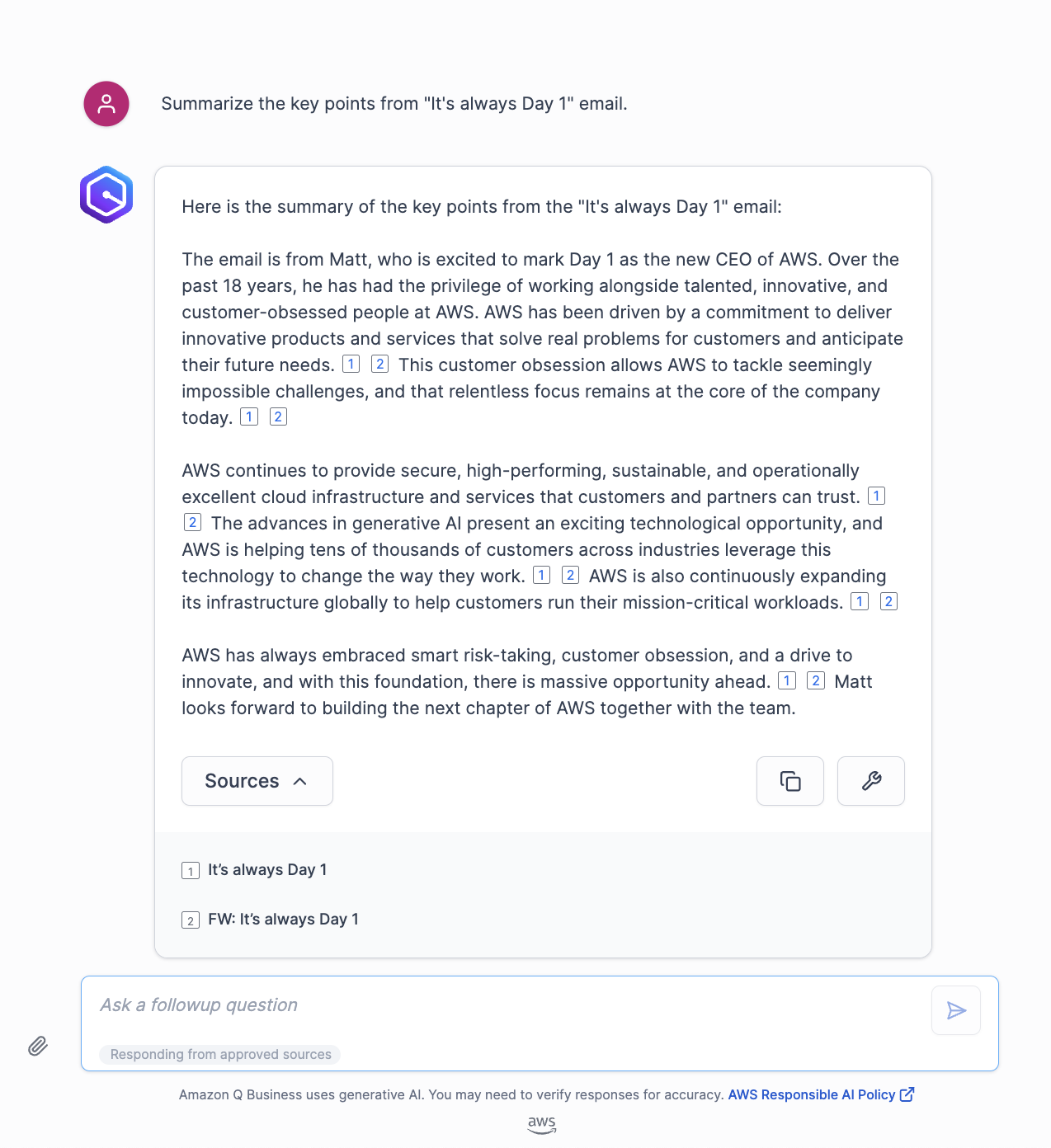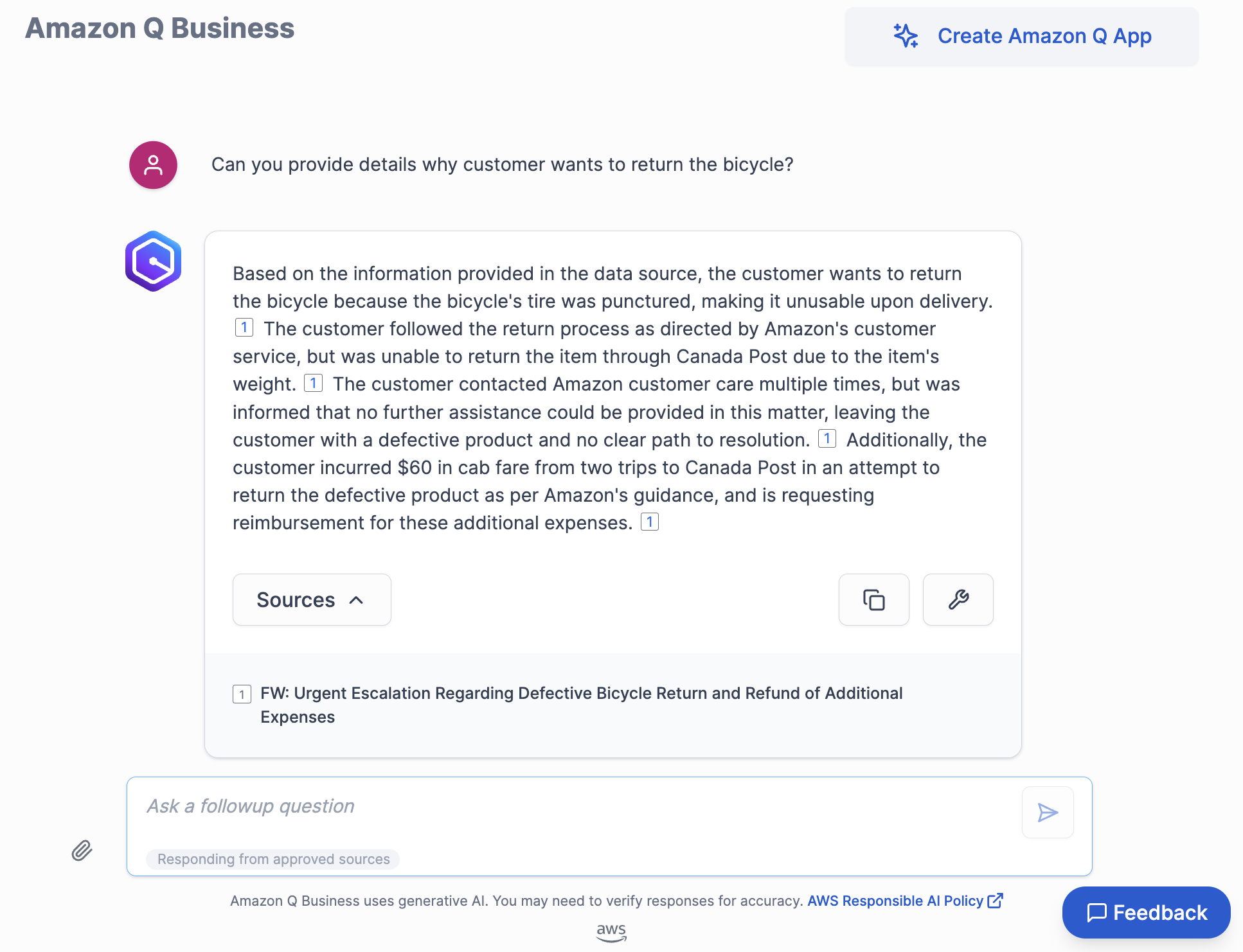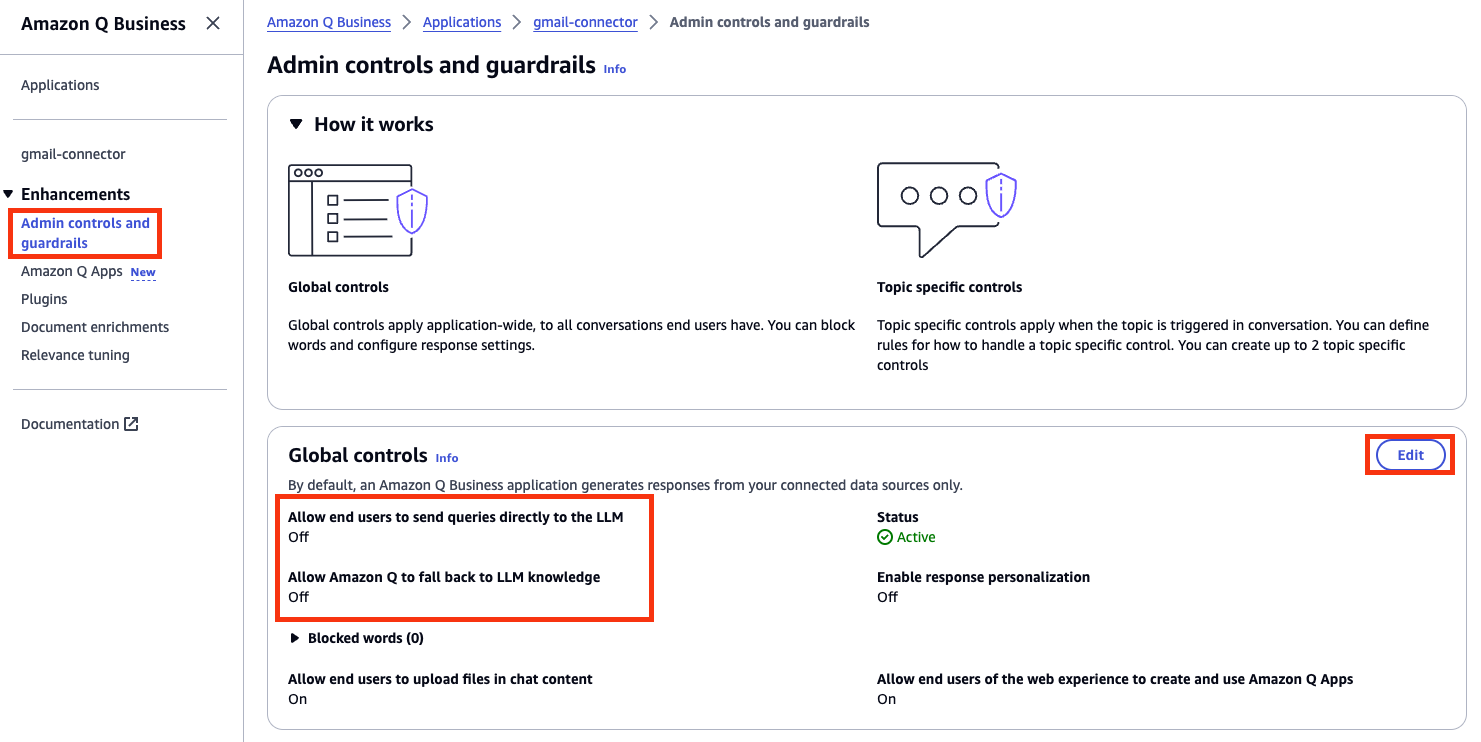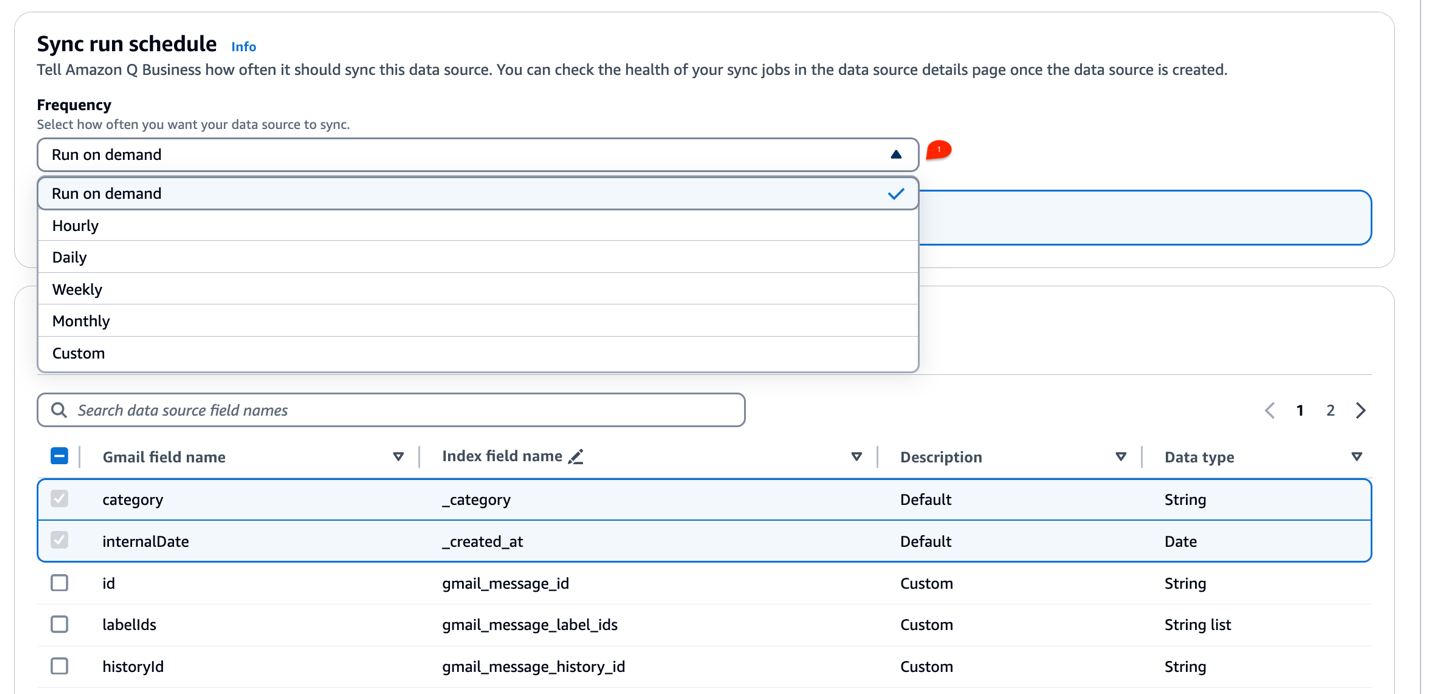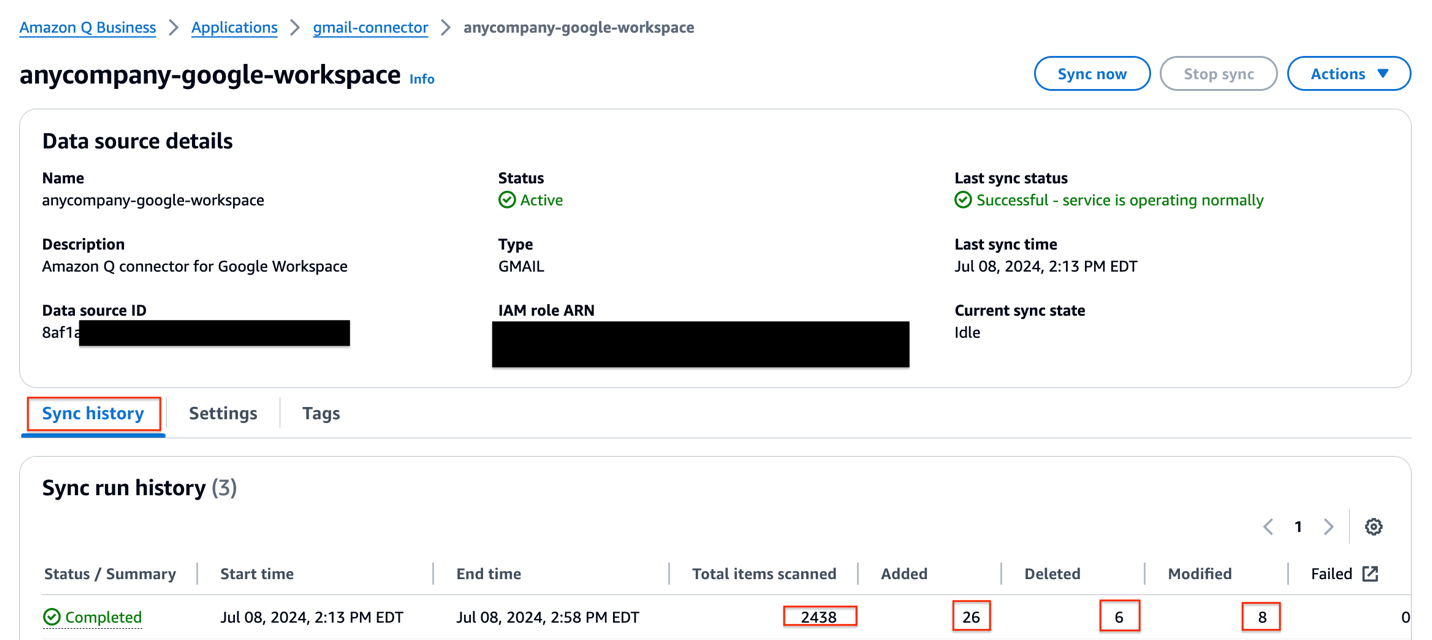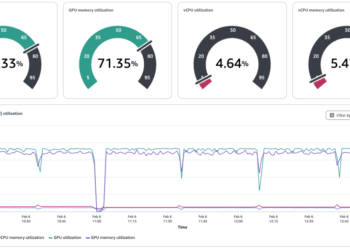Various organizations use Gmail for his or her enterprise electronic mail wants. Gmail for enterprise is a part of Google Workspace, which offers a set of productiveness and collaboration instruments like Google Drive, Gmail, and Google Calendar. Google Drive helps storing paperwork akin to Emails include a wealth of data discovered elsewhere, akin to throughout the topic of an electronic mail, the message content material, and even attachments. Performing an clever search on emails with co-workers will help you discover solutions to questions, bettering productiveness and enhancing the general buyer expertise for the group.
Amazon Q Enterprise is a totally managed, generative AI-powered assistant designed to reinforce enterprise operations. It may be tailor-made to particular enterprise wants by connecting to firm knowledge, info, and techniques via over 40 built-in connectors.
Amazon Q Enterprise permits customers in varied roles, akin to entrepreneurs, challenge managers, and gross sales representatives, to have tailor-made conversations, clear up issues, generate content material, take motion, and extra, all via a web-based interface. This instrument goals to make staff work smarter, transfer quicker, and drive extra important influence by offering rapid and related info and streamlining duties.
With the Gmail connector for Amazon Q Enterprise, you may improve productiveness and streamline communication processes inside your group. This integration empowers you to make use of superior search capabilities and clever electronic mail administration utilizing pure language.
On this put up, we information you thru the method of organising the Gmail connector, enabling seamless interplay between Gmail and Amazon Q Enterprise. Whether or not you’re a small startup or a big enterprise, this resolution will help you maximize the potential of your Gmail knowledge and empower your workforce with actionable insights.
Discovering correct solutions from content material in Gmail mailbox utilizing Amazon Q Enterprise
After you combine Amazon Q Enterprise with Gmail, you may ask a query and Amazon Q Enterprise can index via your mailbox and discover related solutions. For instance, you may make the next queries:
- Pure language search – You’ll be able to seek for emails and attachments inside your mailbox utilizing pure language, making it easy to search out your required info with out having to recollect particular key phrases or filters
- Summarization – You’ll be able to request a concise abstract of the conversations and attachments matching your search question, permitting you to shortly grasp the important thing factors with out having to manually sift via particular person objects
- Question clarification – In case your question is ambiguous or lacks ample context, Amazon Q Enterprise can have interaction in a dialogue to make clear the intent, so that you obtain probably the most related and correct outcomes
Overview of the Gmail connector for Amazon Q Enterprise
To crawl and index contents in Gmail, you may configure the Gmail connector for Amazon Q Enterprise as a knowledge supply in your Amazon Q Enterprise utility. While you join Amazon Q Enterprise to a knowledge supply and provoke the sync course of, Amazon Q Enterprise crawls and indexes paperwork from the info supply into its index.
An information supply connector is a mechanism for integrating and synchronizing knowledge from a number of repositories into one container index. An information supply is a knowledge repository or location that Amazon Q Enterprise connects to in an effort to retrieve your electronic mail knowledge. After you arrange the connector, you may create one or a number of knowledge sources inside Amazon Q Enterprise and configure them to begin indexing emails out of your Gmail account.
Forms of paperwork
Gmail messages will be sorted and saved inside your electronic mail inbox utilizing folders and labels.
Let’s seems to be at what are thought-about as paperwork within the context of the Gmail connector for Amazon Q Enterprise. The connector helps the crawling of the next entities in Gmail:
- E mail – Every electronic mail is taken into account a single doc
- Attachment – Every electronic mail attachment is taken into account a single doc
Moreover, supported customized metadata and customized objects are additionally crawled throughout the sync course of.
The Gmail connector for Amazon Q Enterprise additionally helps the indexing of a wealthy set of metadata from the varied entities in Gmail. It additional offers the flexibility to map these supply metadata fields to Amazon Q index fields for indexing. These area mappings mean you can map Gmail area names to Amazon Q index area names. There are three varieties of metadata fields that Amazon Q connectors assist:
- Default fields – These are required with every doc, such because the title, creation date, or creator
- Non-obligatory fields – These are supplied by the info supply, and the administrator can optionally select a number of of those fields in the event that they include necessary and related info to provide correct solutions
- Customized metadata fields – These are fields created within the knowledge supply along with what the info supply already offers
Consult with Gmail knowledge supply connector area mappings for extra info.
Authentication
Earlier than we index the content material from Gmail, we have to first set up a safe connection between the Gmail connector for Amazon Q Enterprise together with your Google service account. To determine a safe connection, we have to authenticate with the info supply.
The connector helps authentication utilizing a Google service account. We describe the method of making an account later on this put up. For extra details about authentication, see Gmail connector overview.
Safe querying with ACL crawling and id crawling
Safe querying is when a consumer runs a question and is returned solutions solely from paperwork that the consumer has entry to. To allow customers to do safe querying, Amazon Q Enterprise honors the entry management lists (ACLs) of the paperwork. Amazon Q Enterprise does this by first supporting the indexing of ACLs. Indexing paperwork with ACLs is essential for sustaining knowledge safety, as a result of paperwork with out ACLs are thought-about public. Moreover, the consumer’s credentials (electronic mail handle) are handed together with the question in order that solutions from paperwork which can be related and which consumer is allowed to entry are displayed.
When connecting a Gmail knowledge supply, Amazon Q Enterprise crawls the ACL info hooked up to a doc (consumer and group info) out of your Gmail occasion. In Gmail, consumer IDs are mapped to _user_id. Person IDs exist in Gmail on recordsdata with set entry permissions. They’re mapped from the consumer emails because the IDs in Gmail.
When a consumer logs in to an online utility to conduct a search, the consumer’s credentials, akin to an electronic mail handle, have to match what’s within the ACL of the doc to return outcomes from that doc. The net utility that the consumer makes use of to retrieve solutions is linked to an id supplier (IdP) or AWS IAM Id Middle. The consumer’s credentials from the IdP or IAM Id Middle are referred to right here because the federated consumer credentials. The federated consumer credentials are handed together with the question in order that Amazon Q can return the solutions from the paperwork that this consumer has entry to.
Consult with How Amazon Q Enterprise connector crawls Gmail ACLs for extra info.
Answer overview
Within the following sections, we display how you can arrange the Gmail connector for Amazon Q Enterprise. Then we offer examples of how you can use the AI-powered chat interface to achieve insights from the linked knowledge supply.
In our resolution, we index emails from Gmail by configuring the Gmail knowledge supply connector. This connector means that you can question your Gmail knowledge utilizing Amazon Q Enterprise as your question engine.
After the configuration is full, you may configure how typically Amazon Q Enterprise ought to synchronize together with your Gmail account to maintain updated with the e-mail content material. This course of makes positive that your electronic mail interactions are systematically up to date inside Amazon Q Enterprise, enabling you to question and uncover beneficial insights out of your Gmail knowledge.
The next diagram illustrates the answer structure. Google Workspace is the info supply. Emails and attachments together with the ACL info are handed to Amazon Q Enterprise from the Google workspace. The consumer submits a question to the Amazon Q Enterprise utility. Amazon Q Enterprise retrieves the ACL of the consumer and offers solutions primarily based on the emails and attachments that the consumer has entry to.
Conditions
It’s best to have the next:
Configure the Gmail connector for an Amazon Q Enterprise utility
To allow Amazon Q Enterprise to entry and index emails from Gmail accounts throughout the group, it’s important to configure the group’s Google workspace. Within the steps that comply with, we create a service account that will likely be utilized by the Gmail connector for Amazon Q Enterprise to index emails.
We offer the service account with authorization scopes to permit entry to the required Gmail APIs. The authorization scopes specific the permissions you request customers to authorize in your utility and are relevant to emails inside your group’s Google workspace.
Full the next steps:
- Log in to your group’s Google Cloud account.
- Create a brand new challenge with an applicable identify and assign it to your group. In our instance, we identify the challenge
GmailConnector. - Select Create.
- After you create the challenge, on the navigation menu, select APIs and Providers and Library to view the API Library.
- On the API Library web page, seek for and select Admin SDK API.
The Admin SDK API permits managing the Google workspace account sources and audit utilization.
- Select Allow.
- Equally, seek for the Gmail API on the API Library
The Gmail API will help in viewing and managing the Gmail mailbox knowledge like threads, messages, and labels.
- Select Allow to allow this API.
We now create a service account. The service account will likely be utilized by the Amazon Q Enterprise Gmail knowledge supply connector to entry the group’s emails primarily based on the allowed API scope.
- On the navigation menu, select IAM and Admin and Service accounts.
- Select Create service account.
- Title the service account
Amazon-q-integration-gmail, enter an outline, and select Create and proceed. - Skip the elective sections Grant this service account entry to challenge and Grant customers entry to this service account.
- Select Performed.
- Select the service account you created to navigate to the service account particulars web page.
- Notice the distinctive ID for the service account—the distinctive ID is also called the consumer ID, and will likely be utilized in later steps.
Subsequent, we create the keys for the service account, which is able to permit it for use by the Gmail connector for Amazon Q Enterprise.
- On the Keys tab, select Add key and Create new key.
- When prompted for the important thing sort, choose the advisable possibility JSON and select Create.
This can obtain the non-public key to your pc, which should be saved secure to permit configuration throughout the Amazon Q console. The next screenshot exhibits an instance of the credentials JSON file.
- On the Particulars tab, increase the Superior settings part and select View Google Workspace Admin console within the Area-wide Delegation
Granting entry to the service account utilizing a domain-wide delegation to your group’s knowledge should be handled as a privileged operation and carried out with warning. You’ll be able to reverse the entry grant by disabling or deleting the service account or eradicating entry via the Google Workspace Admin console.
- Use the Google Workspace Admin credentials to log in to the Google Workspace Admin console.
- Underneath Safety on the navigation menu, below Entry and knowledge management, select API controls.
- Within the Area-wide delegation part, select Handle domain-wide delegation.
- Select Add new.
- Within the Add a brand new consumer ID dialog, enter the distinctive ID for the service account you created.
- Enter the next scopes to permit the service account to entry the emails from Gmail:
- https://www.googleapis.com/auth/gmail.readonly – This scope permits to you to view your electronic mail messages and settings.
- https://www.googleapis.com/auth/admin.listing.consumer.readonly – This scope permits to see and obtain your group’s Google Workspace listing.
For extra particulars about all of the scopes accessible, confer with OAuth 2.0 Scopes for Google APIs.
- Select Authorize.
This concludes the configuration throughout the Google Cloud console and Google Workspace Admin console.
Create the Gmail connector for an Amazon Q Enterprise utility
This put up assumes that an Amazon Q Enterprise utility has already been created beforehand. If you happen to haven’t created one but, confer with Construct non-public and safe enterprise generative AI apps with Amazon Q Enterprise and AWS IAM Id Middle for directions.
Full the next steps to configure the connector:
- On the Amazon Q Enterprise console, select Functions within the navigation pane.
- Choose the applying that you simply need to add the Gmail connector to.
- On the Actions menu, select Edit.
- On the Replace utility web page, depart all values unchanged and select Replace.
- On the Replace retriever web page, depart all values as default and select Subsequent.
- On the Join knowledge sources web page, on the All tab, seek for Gmail within the search area.
- Select the plus signal subsequent to Gmail, which is able to open up a web page to arrange the info supply.
- Within the Title and outline part, enter a reputation and outline.
- Within the Authentication part, select Create and add new secret.
- Within the Create an AWS Secrets and techniques Supervisor secret pop-up, present the next info:
- Enter a reputation in your Secrets and techniques Supervisor secret.
- For Consumer electronic mail and Non-public key, confer with the JSON file that you simply downloaded to your native machine earlier.
- For Admin account electronic mail, enter the admin account in your Google
- For Non-public key, enter the non-public key particulars.
- Select Save.
- Within the IAM function part, for IAM function, select Create a brand new service function (advisable).
- Within the Sync scope part, choose Message attachments and enter a price for Most file dimension.
- Optionally, configure the next below Extra configuration (we depart all the pieces as default for this put up):
- For Date vary, enter the beginning and finish dates for emails to be crawled. Emails acquired on or after the beginning date and earlier than the tip date are included within the sync scope.
- For E mail domains, enter the e-mail from domains, electronic mail to domains, topic, CC emails, and BCC emails you need to embody or exclude in your index.
- For Key phrases in topics, embody or exclude any paperwork with at the very least one key phrase talked about of their topics
- For Labels, add common expression patterns to incorporate or exclude sure labels or attachment varieties. You’ll be able to add as much as 100 patterns.
- For Attachments, add common expression patterns to incorporate or exclude sure attachments. You’ll be able to add as much as 100 patterns.
- Within the Sync mode part, choose New, modified, or deleted content material sync.
- Within the Sync run schedule part, select the frequency that works finest in your use case. For this put up, we select Run on demand.
- Select Add knowledge supply and await the retriever to be created.
After the info supply is created, you’re redirected to the Join knowledge sources web page so as to add extra knowledge sources as wanted.
- Confirm your knowledge supply is added and select Subsequent.
- On the Replace teams and customers web page, select Add teams and customers.
The customers and teams that you simply add on this part are from the IAM Id Middle customers and teams arrange by your administrator.
- Within the Add or assign customers and teams pop-up window, choose Assign present customers and teams so as to add present customers configured in your linked IAM Id Middle, then select Subsequent.
Optionally, if in case you have permissions so as to add customers to linked IAM Id Middle, you may choose Add new customers.
- Select Get began.
- Seek for customers by consumer show identify or teams by group identify.
- Select the customers or teams you need you add and select Assign.
The teams and customers that you simply added ought to now be accessible on the Teams or Customers tabs.
- Select Assign.
For every group or consumer entry, an Amazon Q Enterprise subscription tier must be assigned.
- To allow a subscription for a bunch, on the Replace teams and customers web page, select the Teams tab (if particular person customers should be assigned a subscription, select the Customers tab).
- Underneath the Subscription column, choose Select subscription and select a subscription (Q Enterprise Lite or Q Enterprise Professional).
- Select Replace utility to finish including and organising the Gmail connector for Amazon Q Enterprise.
Configure Gmail area mappings
That can assist you construction knowledge for retrieval and chat filtering, Amazon Q Enterprise crawls knowledge supply doc attributes or metadata and maps them to fields in your Amazon Q index. Amazon Q has reserved fields that it makes use of when querying your utility. When doable, Amazon Q mechanically maps these built-in fields to attributes in your knowledge supply.
If a built-in area doesn’t have a default mapping, or if you wish to map extra index fields, use the customized area mappings to specify how a knowledge supply attribute maps to your Amazon Q utility.
- On the Amazon Q Enterprise console, select your utility.
- Underneath Knowledge sources, choose your knowledge supply.
- On the Actions menu, select Edit.
- Within the Discipline mappings part, choose the required fields to crawl below Messages and Message attachments and any varieties which can be accessible.
The Gmail connector setup for Amazon Q Enterprise is now full.
To check the connectivity to Gmail and provoke the info synchronization, select Sync now. The preliminary sync course of could take a number of minutes to finish.
When the sync is full, within the Sync run historical past part, you may see the sync standing together with a abstract of how could whole objects had been added, deleted, modified, and failed throughout the sync course of.
Question Gmail knowledge utilizing the Amazon Q net expertise
Now that the info synchronization is full, you can begin exploring insights from Amazon Q. Within the newly created Amazon Q utility, select Customise net expertise to open a brand new tab with a preview of the UI and choices to customise as per your wants.
You’ll be able to customise the Title, Subtitle, and Welcome message fields in line with your wants, which will likely be mirrored within the UI.
For this walkthrough, we use the defaults and select View net expertise to be redirected to the login web page for the Amazon Q utility.
Log in to the applying utilizing the credentials for the consumer that had been added to the Amazon Q utility. After the login is profitable, you’re redirected to the Amazon Q assistant UI, the place you may ask questions utilizing pure language and get insights out of your Gmail index.
The Gmail knowledge supply linked to this Amazon Q Enterprise utility has electronic mail and Gmail attachments. We display how the Amazon Q utility permits you to ask questions in your electronic mail utilizing pure language and obtain responses and insights for these queries.
Let’s start by asking Amazon Q to summarize key factors from Matt Garma’s (CEO of AWS) electronic mail. The next screenshot shows the response and it additionally consists of the e-mail supply from the place it’s producing the response.
For our subsequent instance, let’s ask Amazon Q to offer particulars about return difficulty buyer is going through for a bicycle order they positioned with Amazon. Following screenshot exhibits the main points concerning the difficulty being confronted by the client and consists of the e-mail supply from the place Amazon Q is producing the response.
Troubleshooting
Troubleshooting your Amazon Q Enterprise Gmail connector offers details about error codes you may see for the Gmail connector and steered troubleshooting actions. If you happen to encounter an HTTP standing code 403 (Forbidden) error whenever you open your Amazon Q Enterprise utility, it implies that the consumer is unable to entry the applying. . See Troubleshooting Amazon Q Enterprise and id supplier integration for frequent causes and how you can handle them.
Incessantly requested questions
On this part, we offer steerage to continuously requested questions.
Amazon Q Enterprise is unable to reply your questions
This might occur attributable to a a number of causes:
- No permissions – ACLs utilized to your account doesn’t mean you can question sure knowledge sources. If so, attain out to your utility administrator to verify your ACLs are configured to entry the info sources.
- Knowledge connector sync failed – The info connector might need did not sync info from the supply to the Amazon Q Enterprise utility. Confirm the info connector’s sync run schedule and sync historical past to substantiate the sync is profitable.
If neither of those causes are true in your case, open a assist case to get this resolved.
Learn how to generate responses from authoritative knowledge sources
You’ll be able to configure these choices utilizing Amazon Q Enterprise utility world controls below Admin controls and guardrails.
- Log in as an Amazon Q Enterprise utility administrator.
- Navigate to the applying and select Admin controls and guardrails within the navigation pane.
- Select Edit within the World controls part to regulate these choices.
For extra info, confer with Admin controls and guardrails in Amazon Q Enterprise.
Amazon Q Enterprise responds utilizing previous (stale) knowledge although your knowledge supply is up to date
Every Amazon Q Enterprise knowledge connector will be configured with distinctive sync run schedule frequency. Confirm the sync standing and sync schedule frequency in your knowledge connector to see when the final sync ran efficiently. Your knowledge connector’s sync run schedule might be set to sync at a scheduled time of day, week, or month. If it’s set to run on demand, the sync needs to be run manually. When the sync run is full, confirm the sync historical past to verify the run has efficiently synced all new points. Consult with Sync run schedule for extra info on every possibility.
Learn how to arrange Amazon Q Enterprise utilizing a unique IdP
You’ll be able to arrange Amazon Q Enterprise with one other SAML 2.0-compliant IdP, akin to Okta, Entra ID, or Ping Id. For extra info, see Creating an Amazon Q Enterprise utility utilizing Id Federation via IAM.
Develop the answer
You’ll be able to discover different options in Amazon Q Enterprise. For instance, the Amazon Q Enterprise doc enrichment function helps you management each which paperwork and doc attributes are ingested into your index and the way they’re ingested. With doc enrichment, you may create, modify, or delete doc attributes and doc content material whenever you ingest them into your Amazon Q Enterprise index. For instance, you may scrub personally identifiable info (PII) by selecting to delete any doc attributes associated to PII.
Amazon Q Enterprise additionally gives the next options:
- Filtering utilizing metadata – Use doc attributes to customise and management customers’ chat expertise. That is at the moment supported provided that you employ the Amazon Q Enterprise API.
- Supply attribution with citations – Confirm responses utilizing Amazon Q Enterprise supply attributions.
- Add recordsdata and chat – Let customers add recordsdata immediately into chat and use uploaded file knowledge to carry out net expertise duties.
- Fast prompts – Characteristic pattern prompts to tell customers of the capabilities of their Amazon Q Enterprise net expertise.
To enhance retrieved outcomes and customise the consumer chat expertise, you may map doc attributes out of your knowledge sources to fields in your Amazon Q index. To study extra, see Gmail knowledge supply connector area mappings.
Clear up
To keep away from incurring future costs, clear up any sources you created as a part of this resolution, together with the Amazon Q utility:
- On the Amazon Q console, select Functions within the navigation pane.
- Choose the dashboard you created.
- On the Actions menu, select Delete.
- Delete the IAM roles created for the applying and knowledge retriever.
- If you happen to used IAM Id Middle for this walkthrough, delete your IAM Id Middle occasion.
Conclusion
On this put up, we mentioned how you can configure the Gmail connector for Amazon Q Enterprise and use the AI-powered chat interface to achieve insights from the linked knowledge supply.
To study extra concerning the Gmail connector for Amazon Q Enterprise, confer with Connecting Gmail to Amazon Q Enterprise, the Amazon Q Person Information, and the Amazon Q Developer Information.
Concerning the Authors
 Divyajeet (DJ) Singh is a Sr. Options Architect at AWS Canada. He loves working with prospects to assist them clear up their distinctive enterprise challenges utilizing the cloud. In his free time, he enjoys spending time with household and associates, and exploring new locations.
Divyajeet (DJ) Singh is a Sr. Options Architect at AWS Canada. He loves working with prospects to assist them clear up their distinctive enterprise challenges utilizing the cloud. In his free time, he enjoys spending time with household and associates, and exploring new locations.
 Temi Aremu is a Options Architect at AWS Canada. She is captivated with serving to prospects clear up their enterprise issues with the ability of the AWS Cloud. Temi’s areas of curiosity are analytics, machine studying, and empowering the subsequent era of ladies in STEM.
Temi Aremu is a Options Architect at AWS Canada. She is captivated with serving to prospects clear up their enterprise issues with the ability of the AWS Cloud. Temi’s areas of curiosity are analytics, machine studying, and empowering the subsequent era of ladies in STEM.
 Vineet Kachhawaha is a Sr. Options Architect at AWS specializing in AI/ML and generative AI. He co-leads the AWS for Authorized Tech workforce inside AWS. He’s captivated with working with enterprise prospects and companions to design, deploy, and scale AI/ML purposes to derive enterprise worth.
Vineet Kachhawaha is a Sr. Options Architect at AWS specializing in AI/ML and generative AI. He co-leads the AWS for Authorized Tech workforce inside AWS. He’s captivated with working with enterprise prospects and companions to design, deploy, and scale AI/ML purposes to derive enterprise worth.
 Vijai Gandikota is a Principal Product Supervisor within the Amazon Q and Amazon Kendra group of Amazon Net Providers. He’s chargeable for the Amazon Q and Amazon Kendra connectors, ingestion, safety, and different elements of the Amazon Q and Amazon Kendra providers.
Vijai Gandikota is a Principal Product Supervisor within the Amazon Q and Amazon Kendra group of Amazon Net Providers. He’s chargeable for the Amazon Q and Amazon Kendra connectors, ingestion, safety, and different elements of the Amazon Q and Amazon Kendra providers.
 Dipti Kulkarni is a Software program Growth Supervisor on the Amazon Q and Amazon Kendra engineering workforce of Amazon Net Providers, the place she manages the connector growth and integration groups.
Dipti Kulkarni is a Software program Growth Supervisor on the Amazon Q and Amazon Kendra engineering workforce of Amazon Net Providers, the place she manages the connector growth and integration groups.

